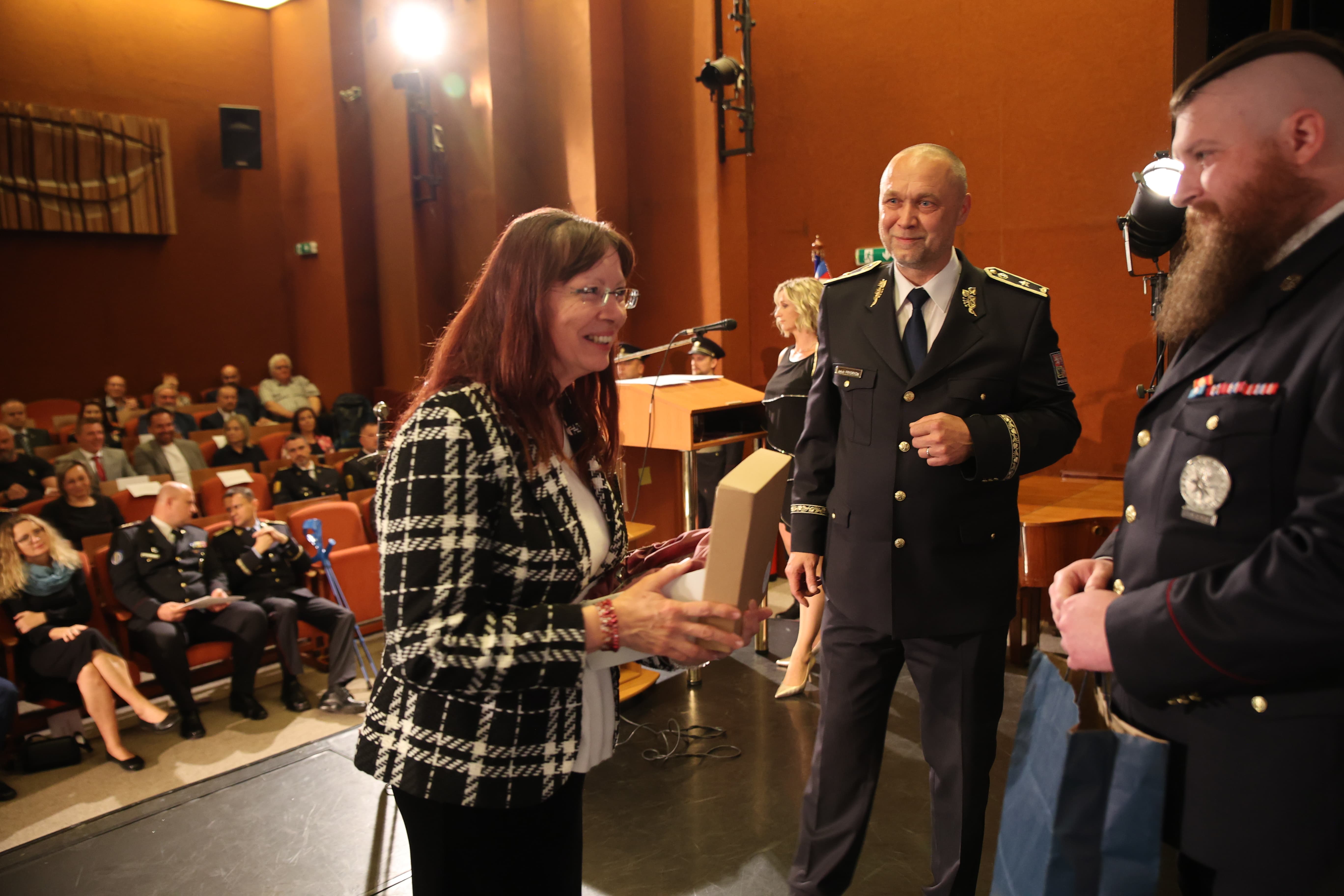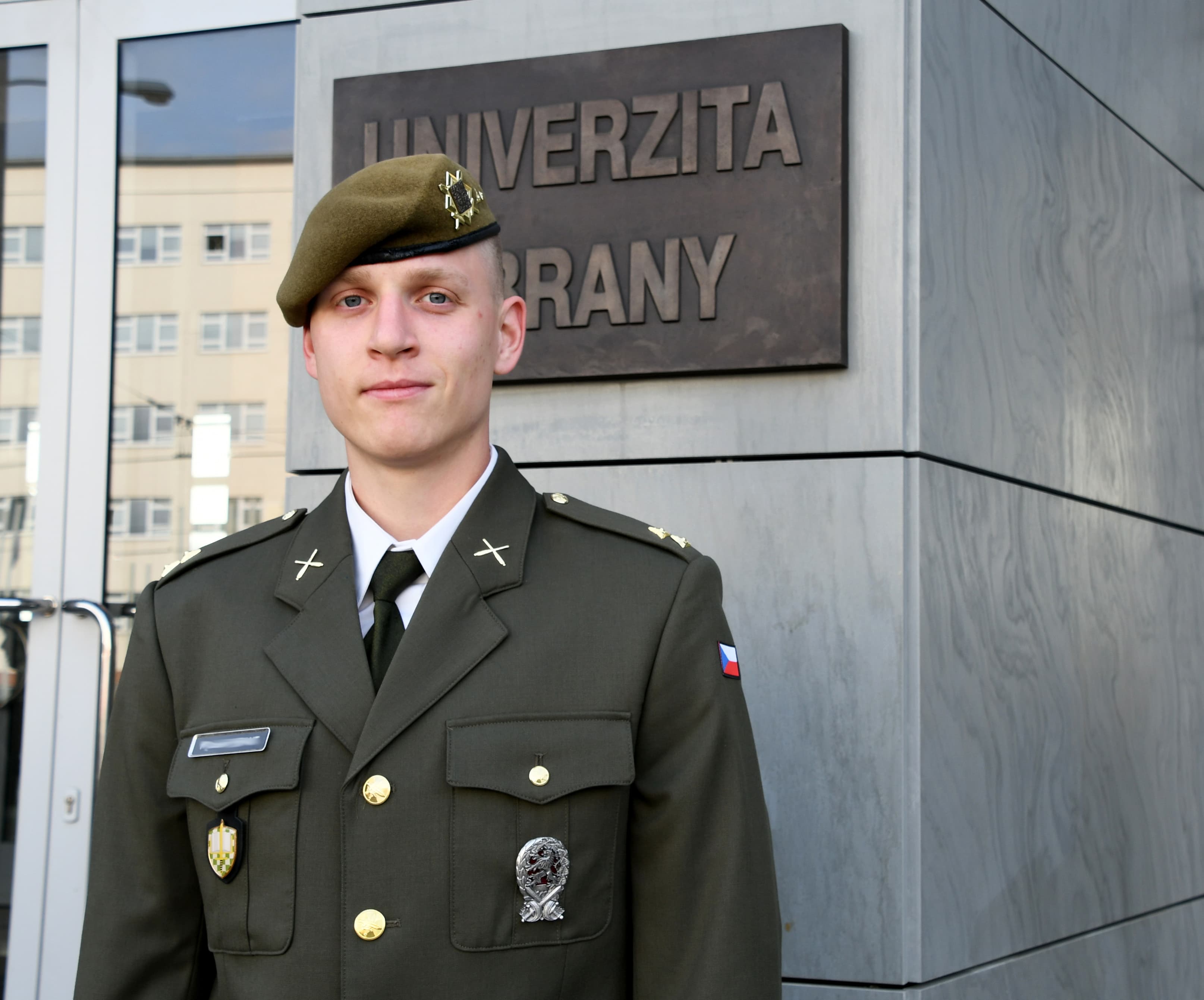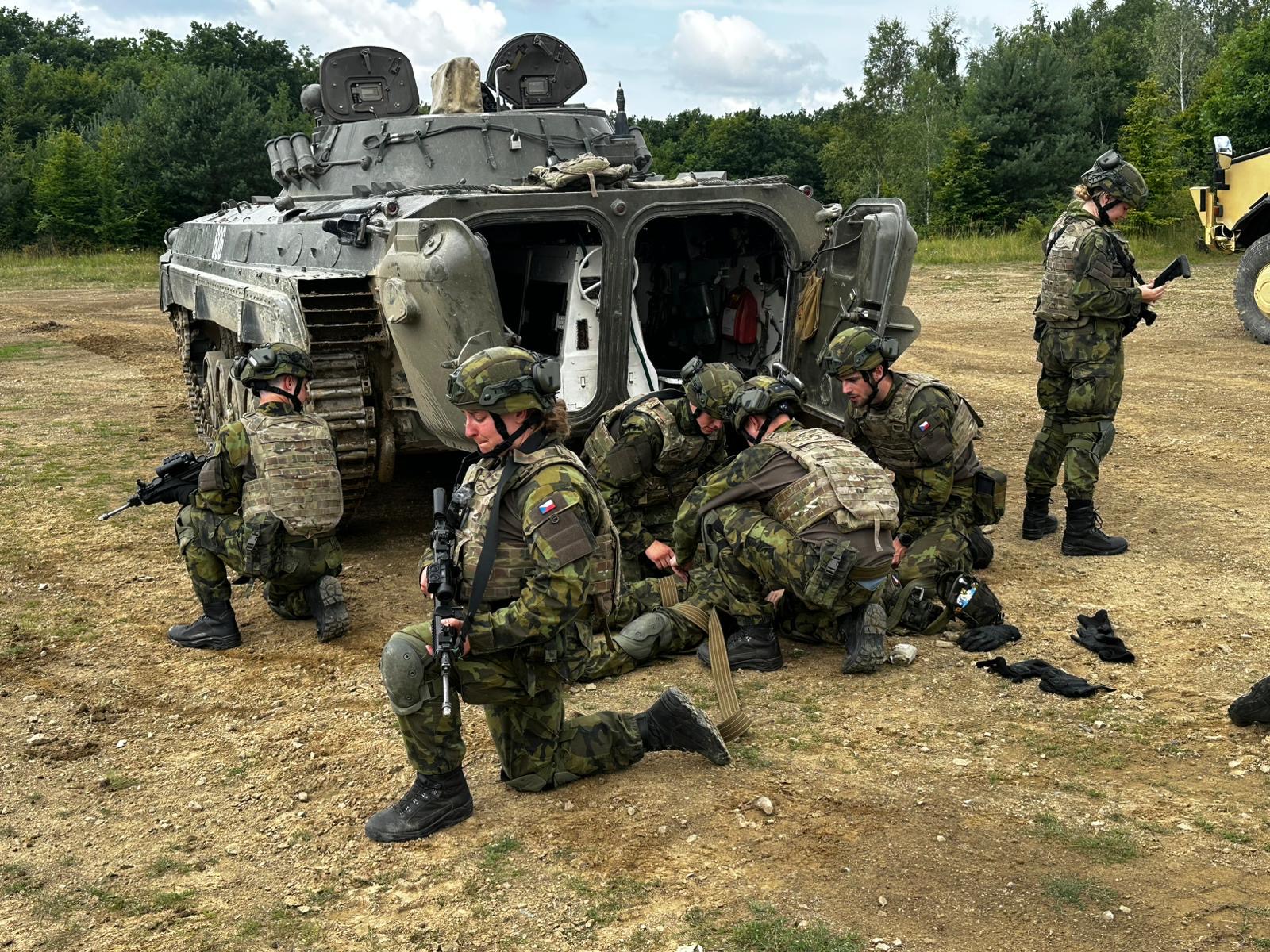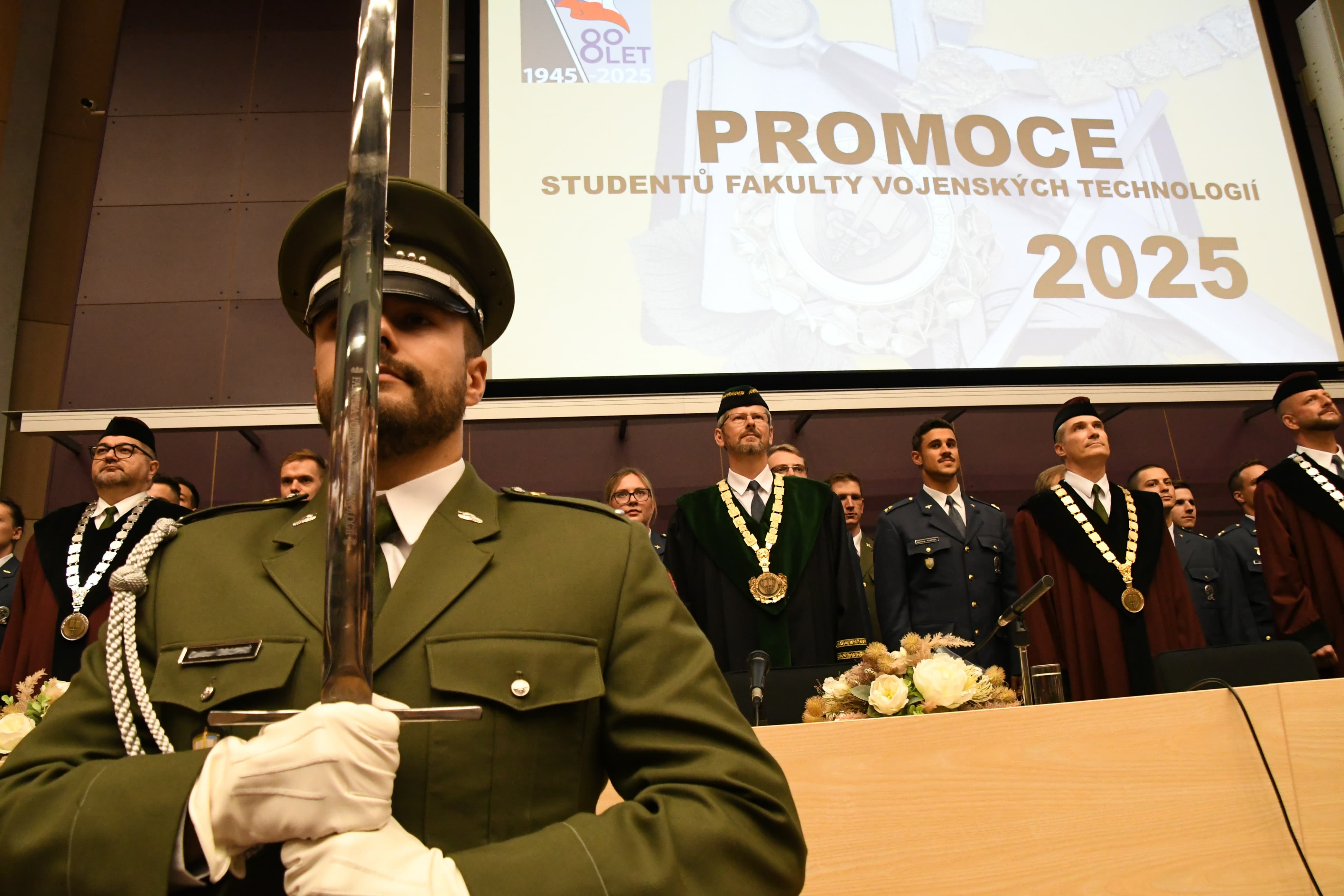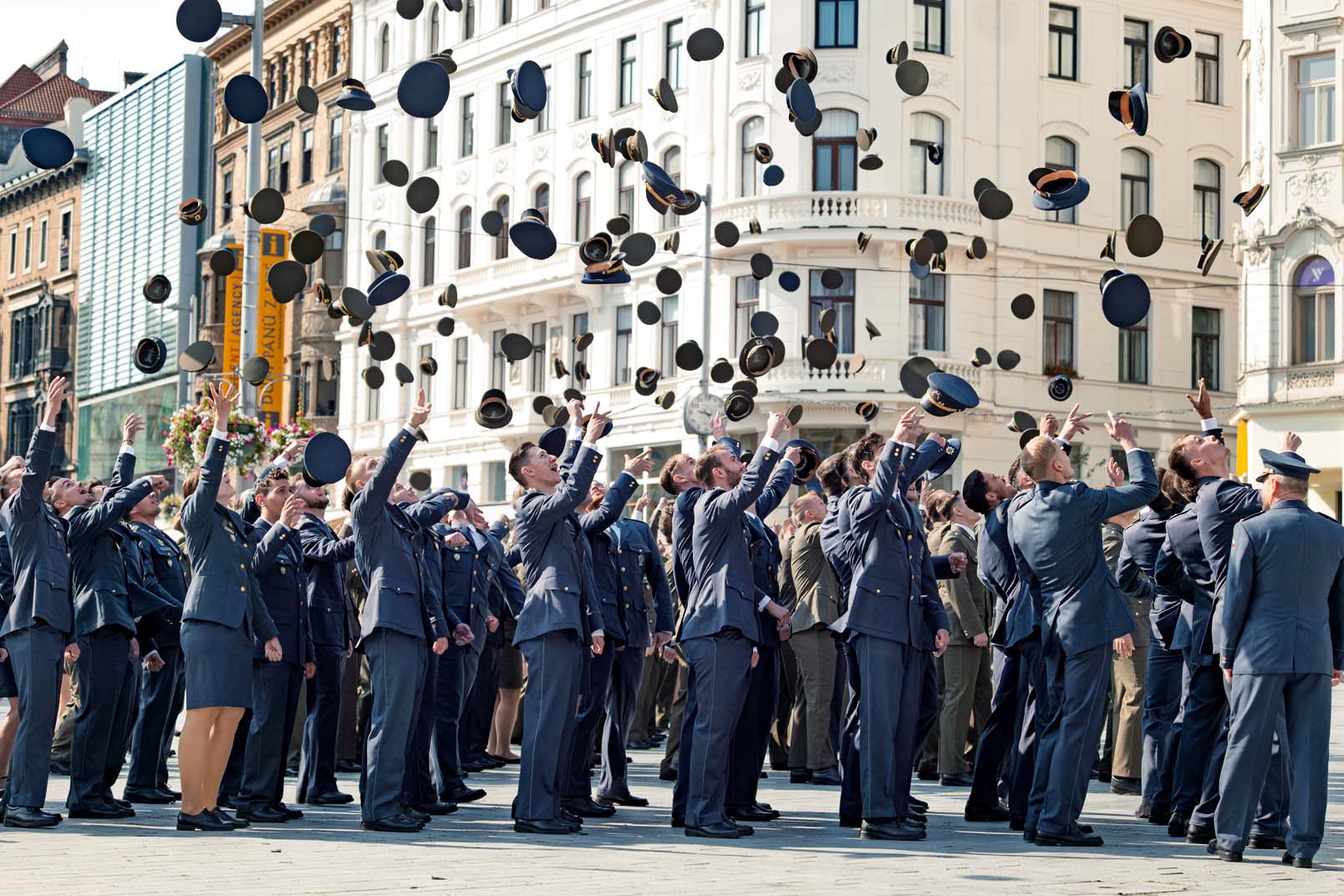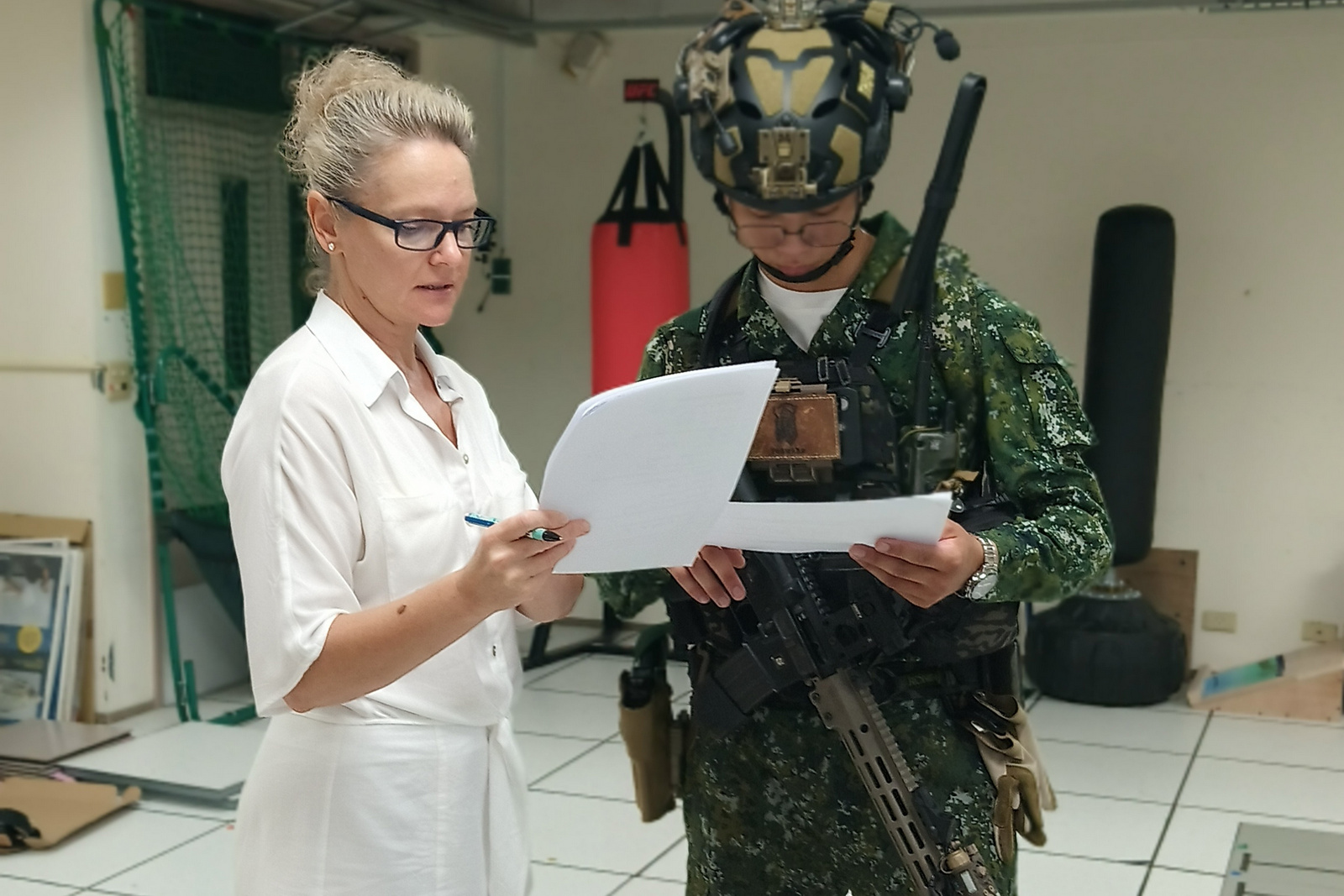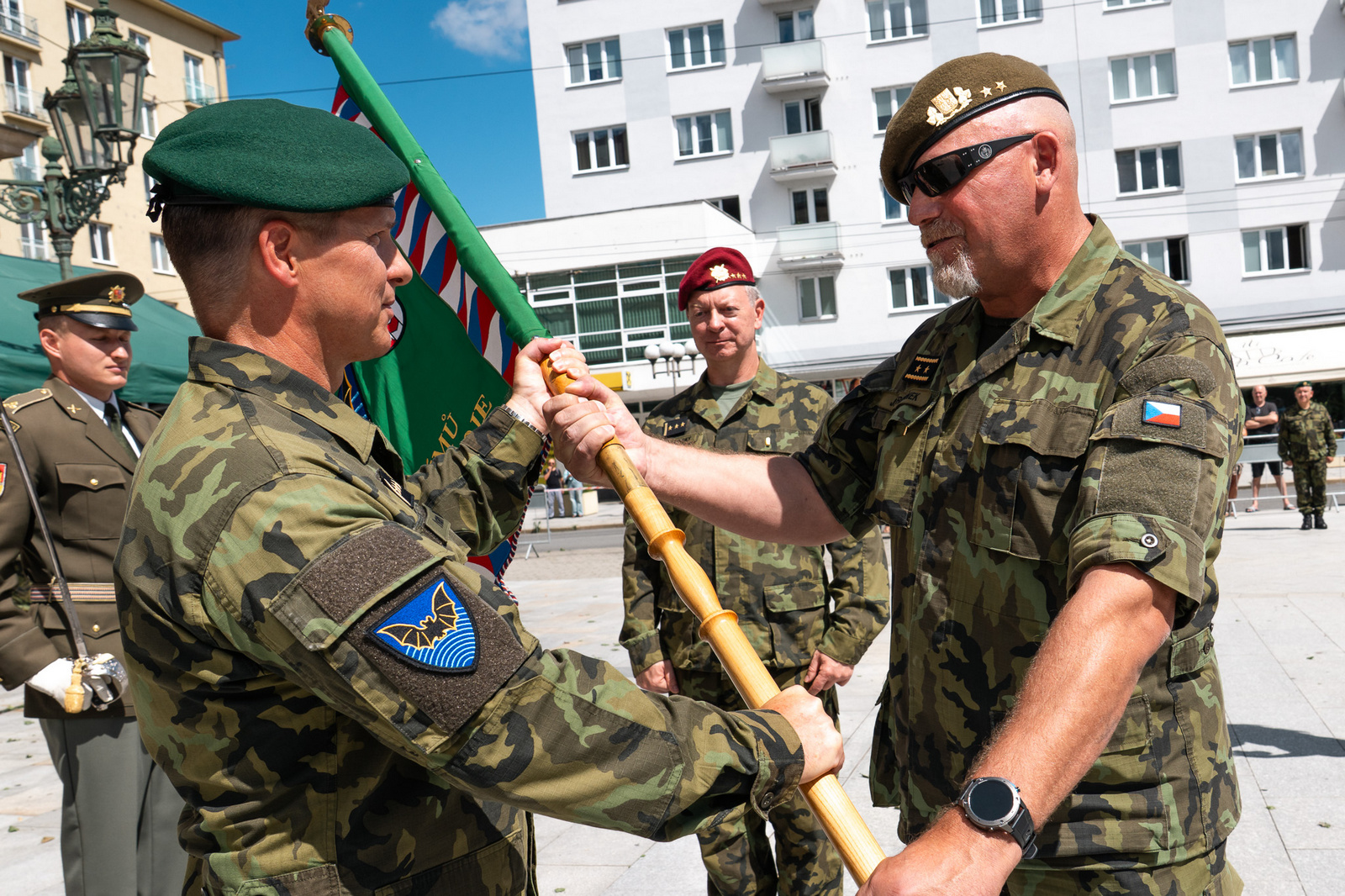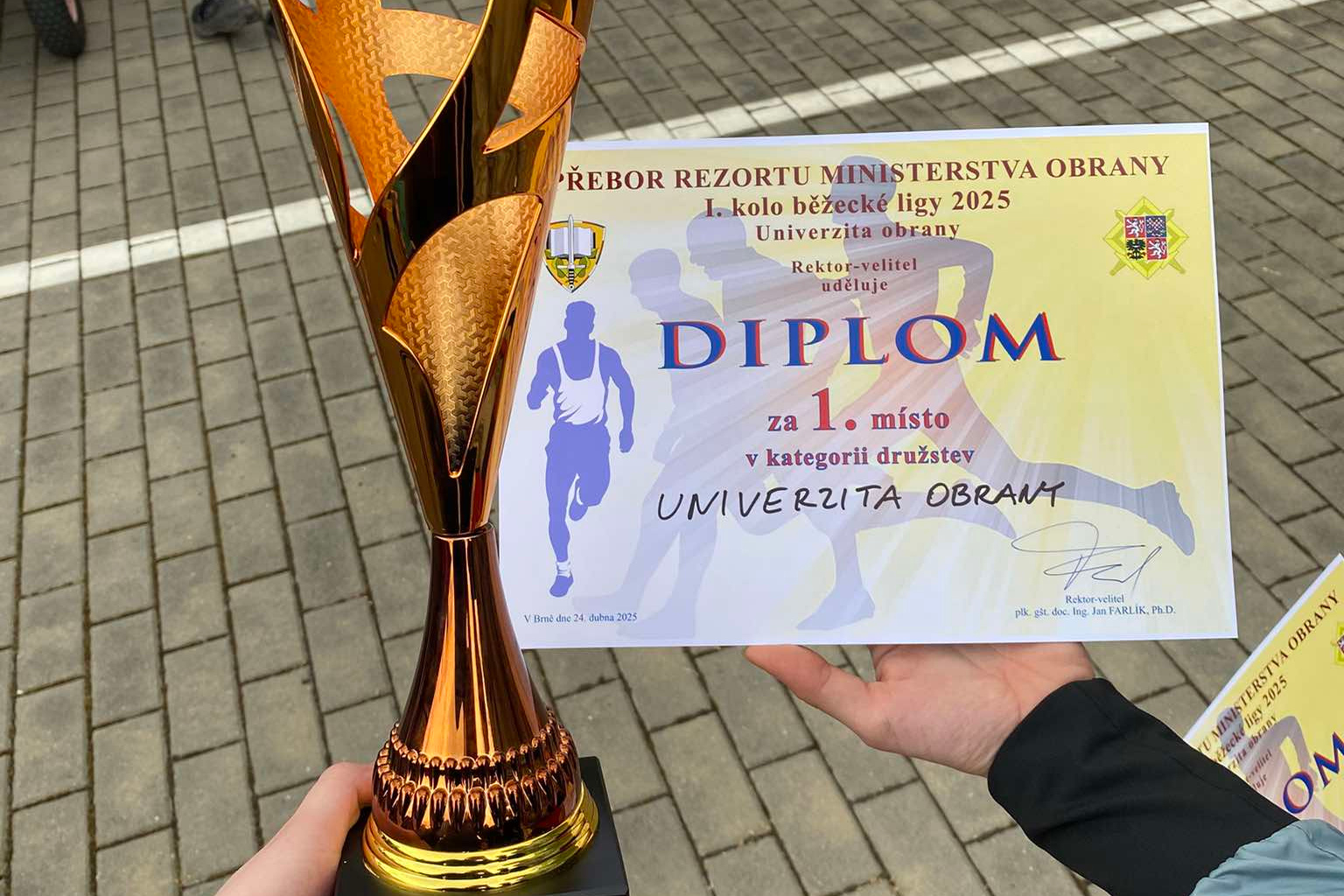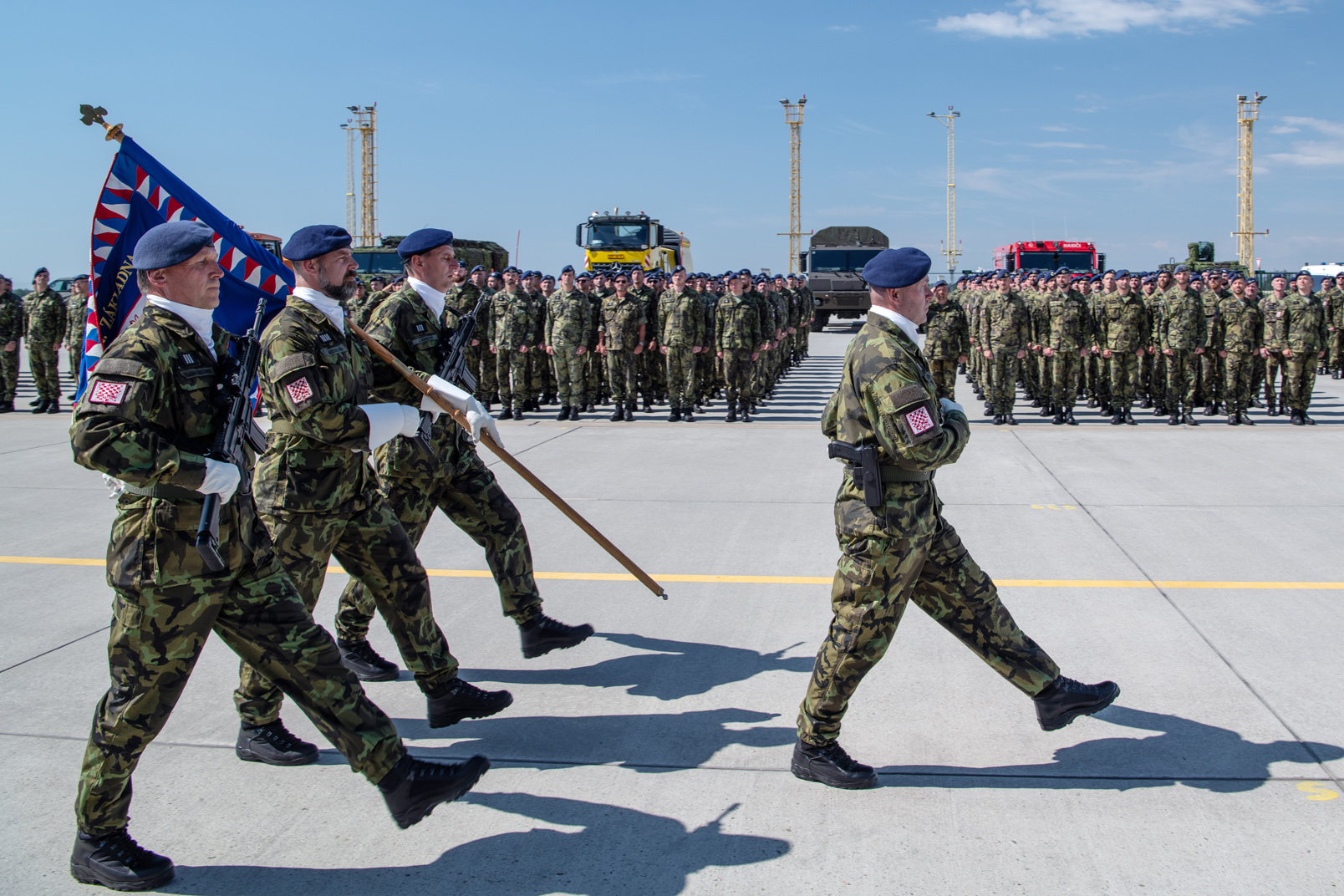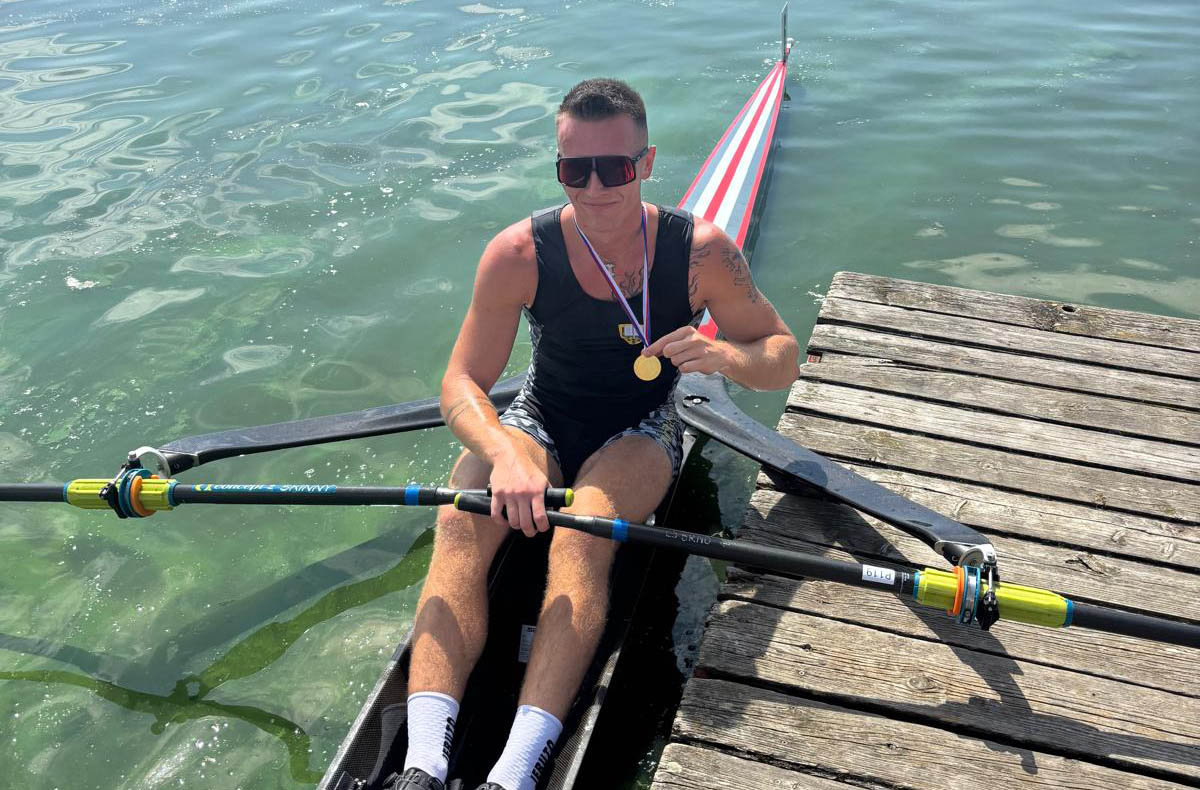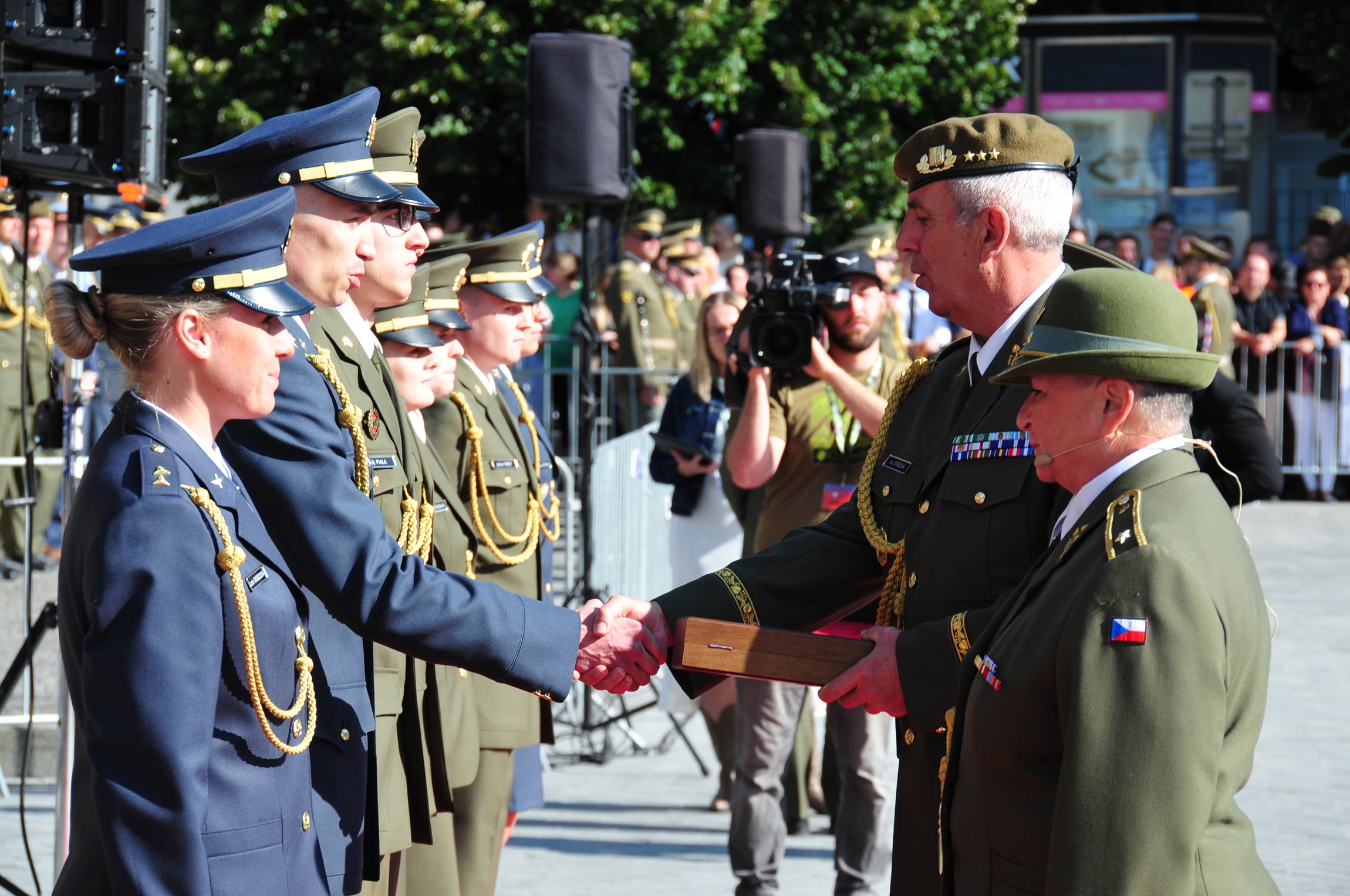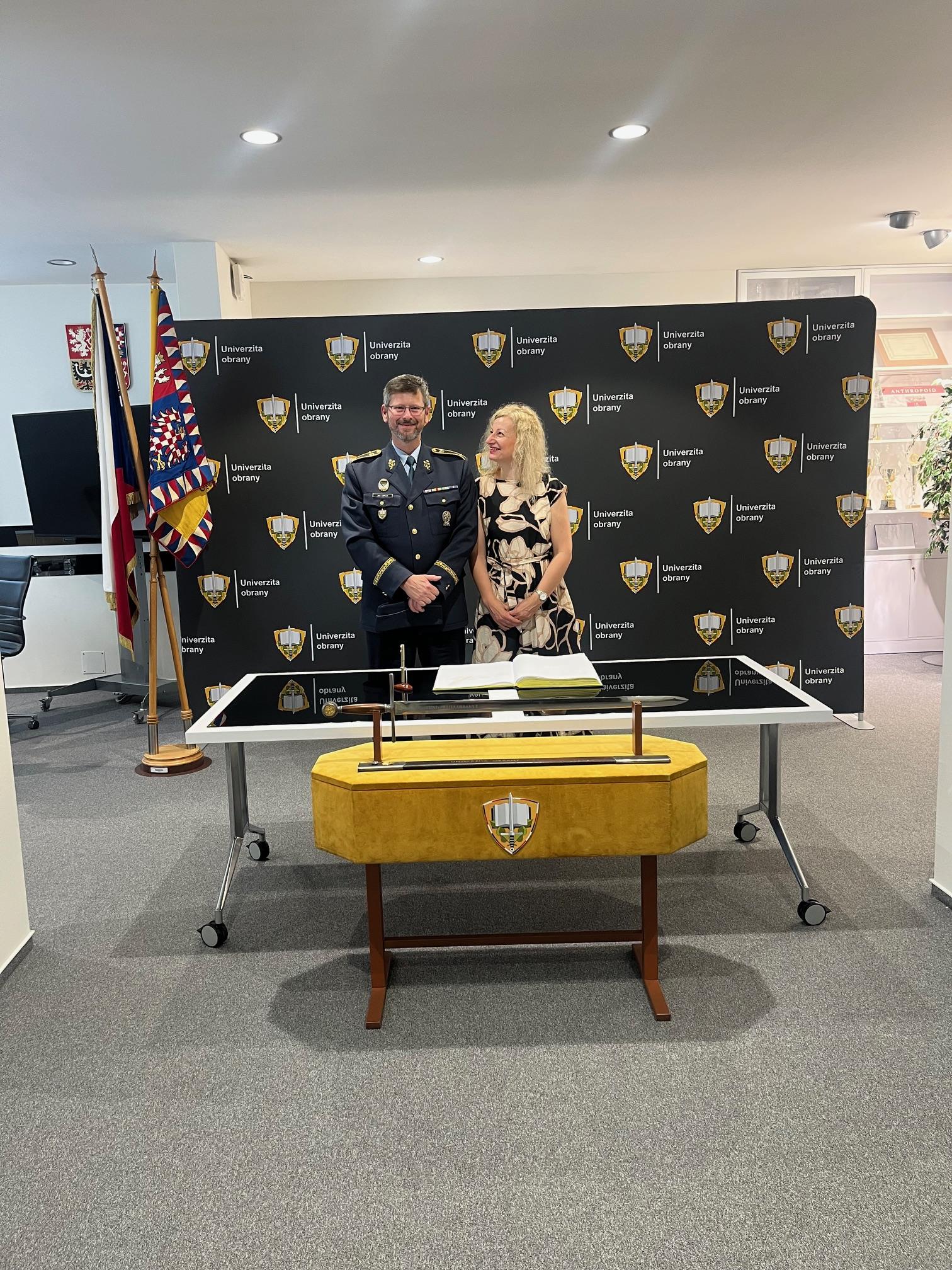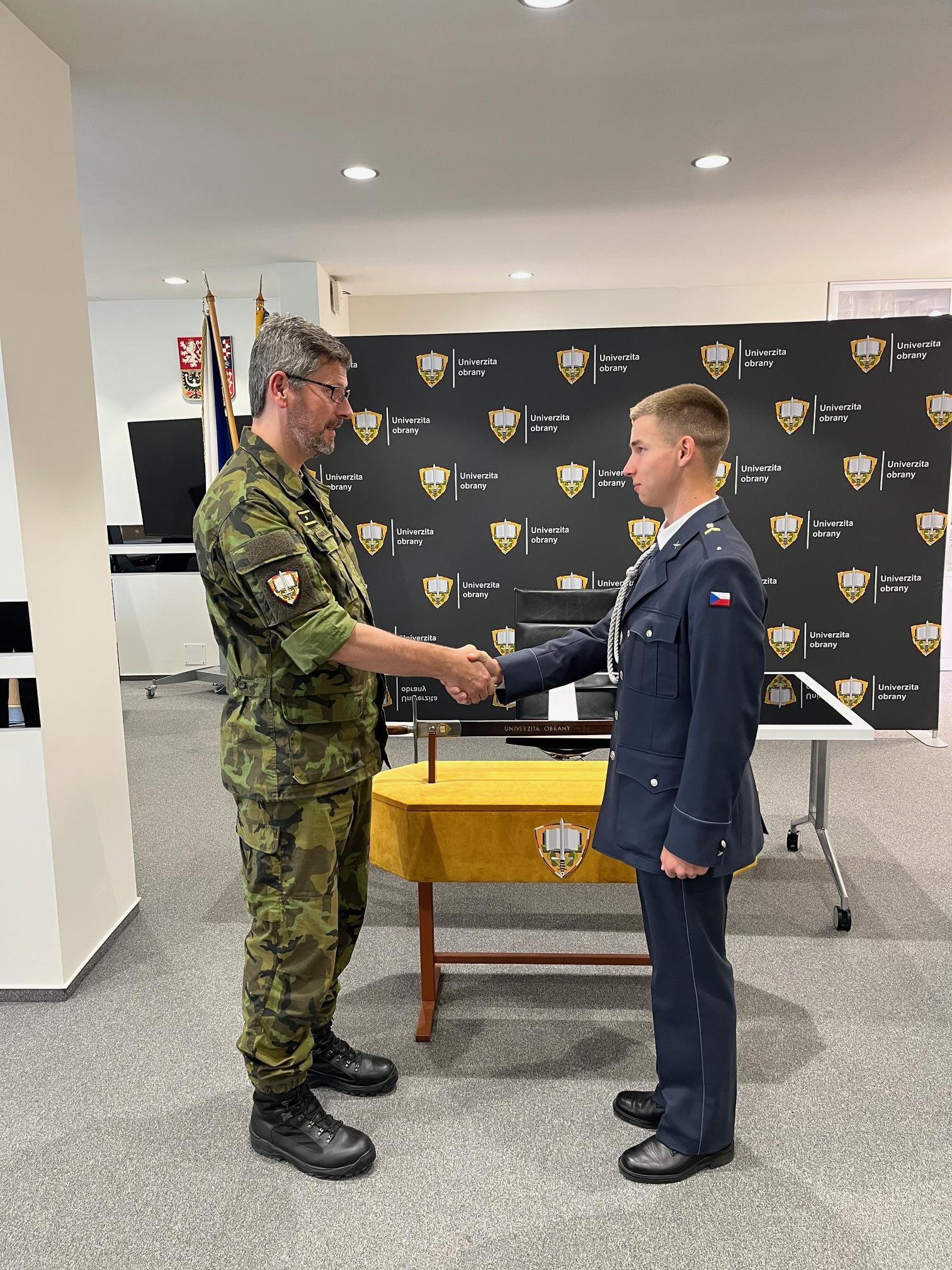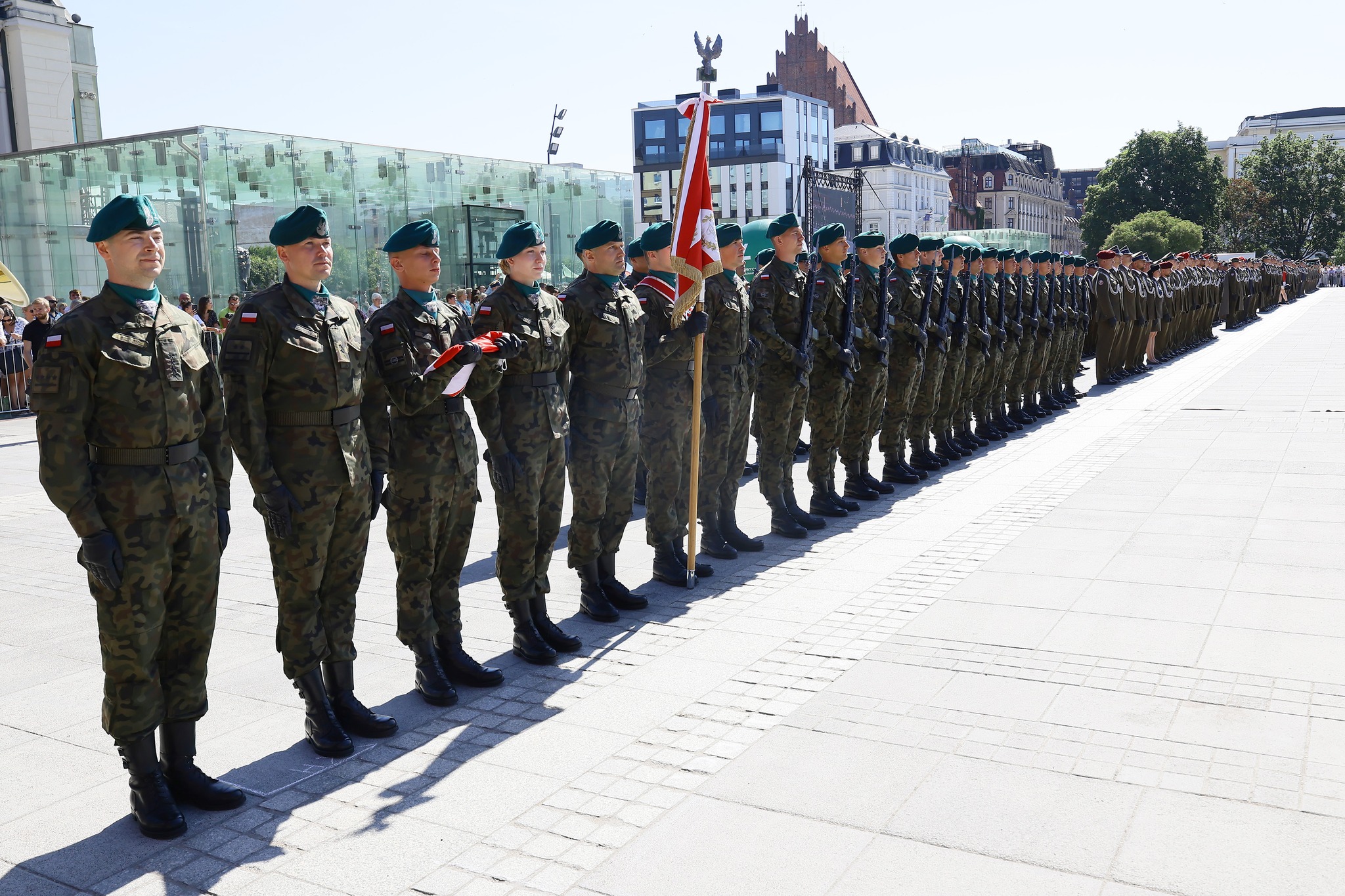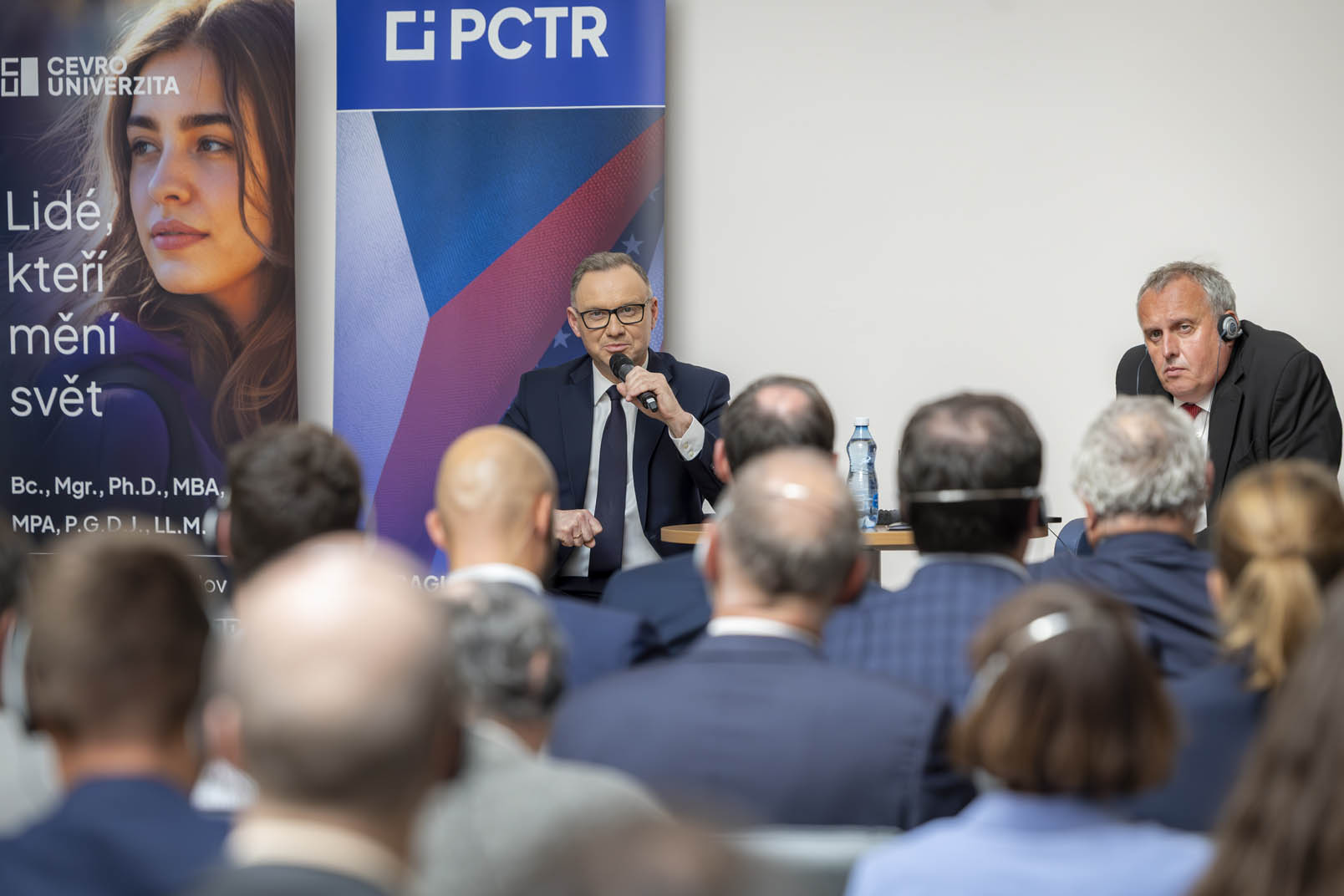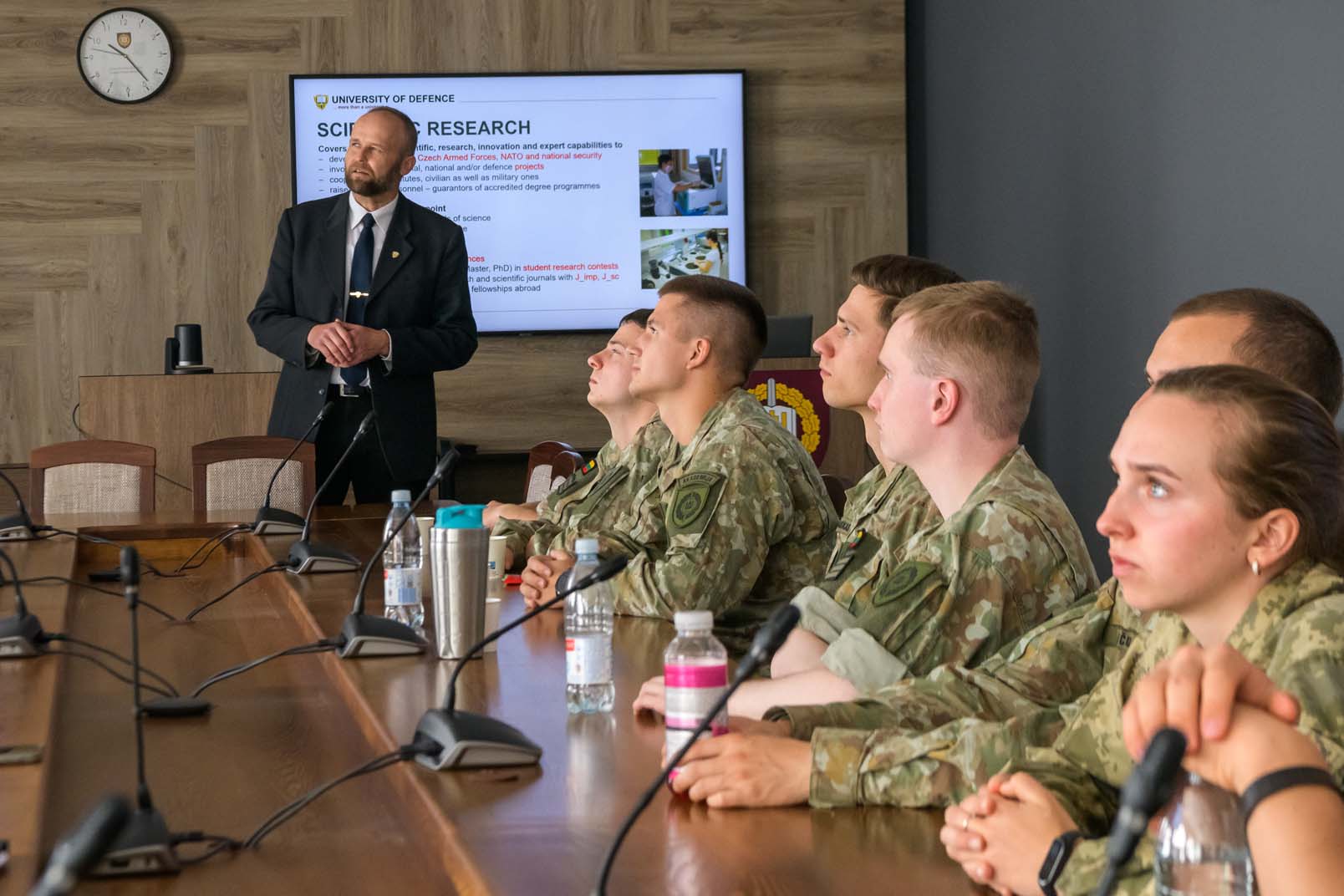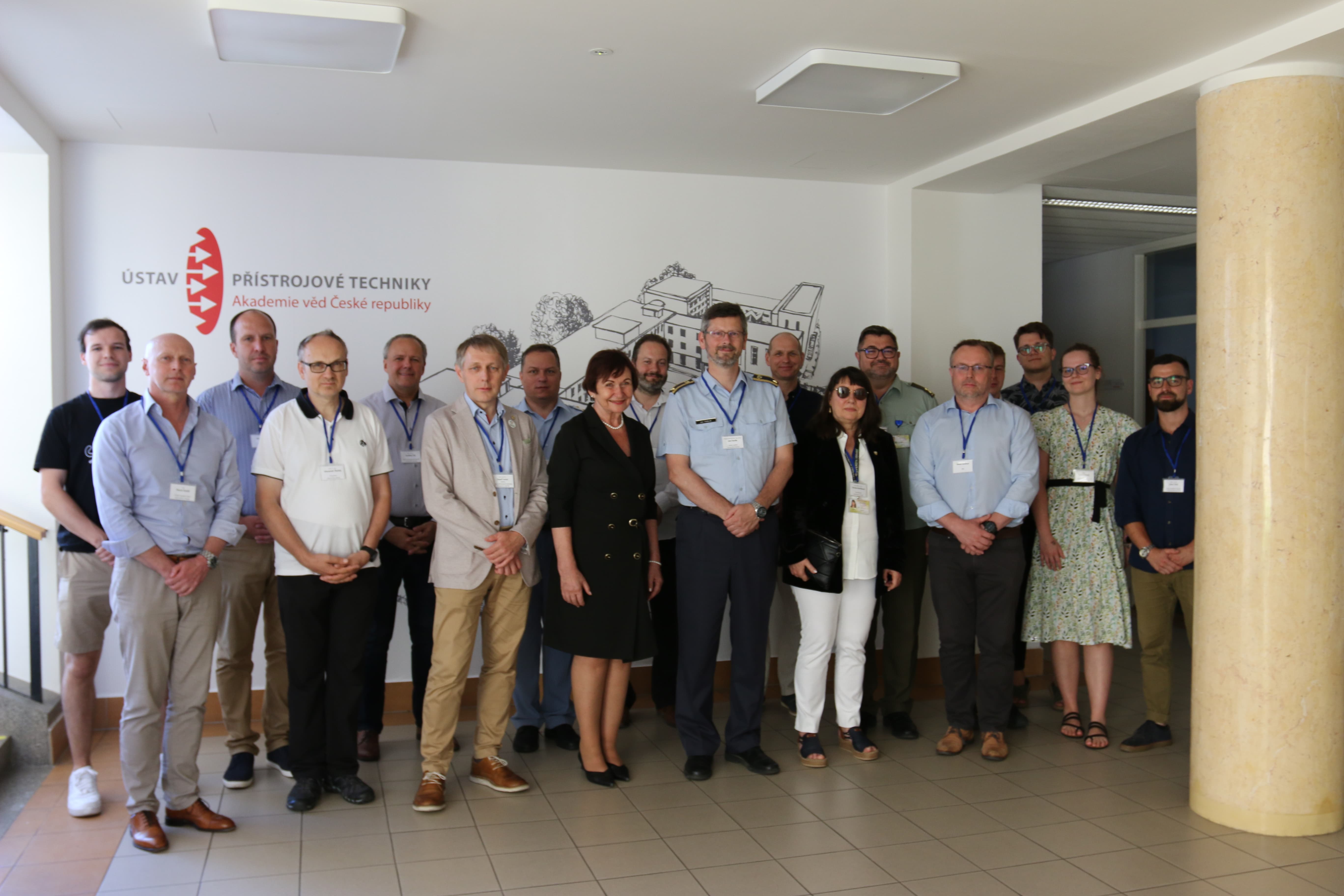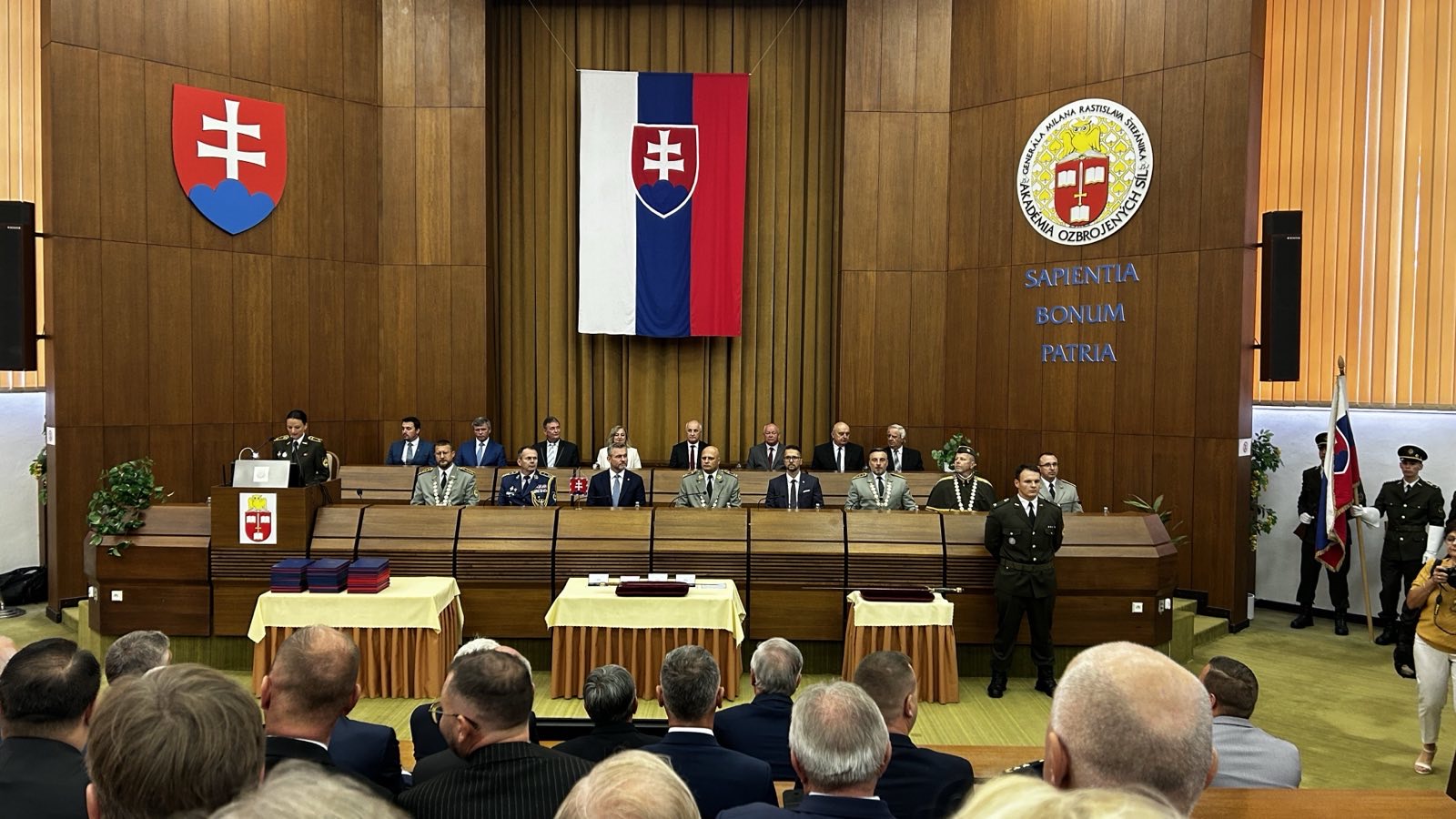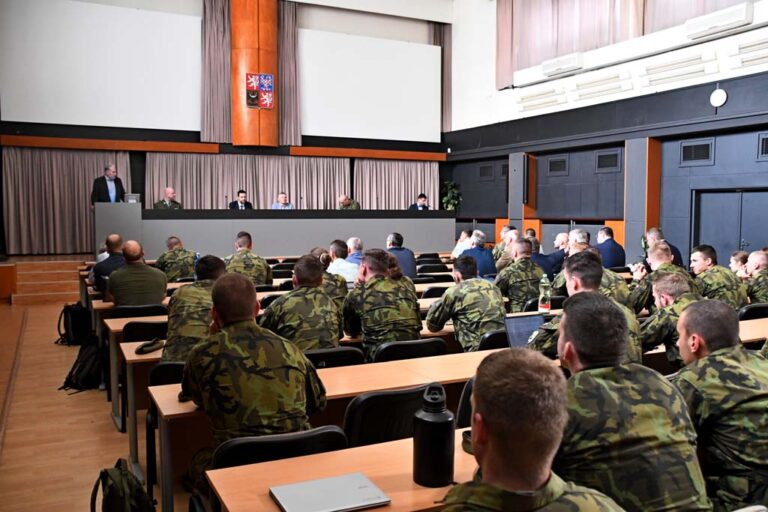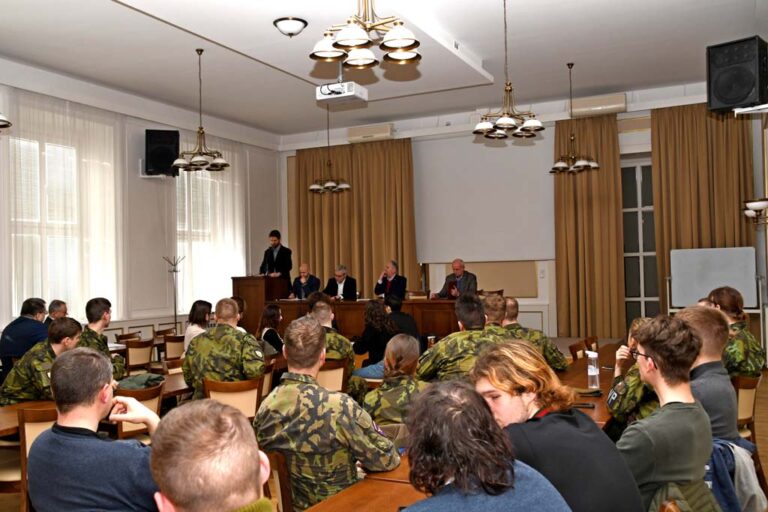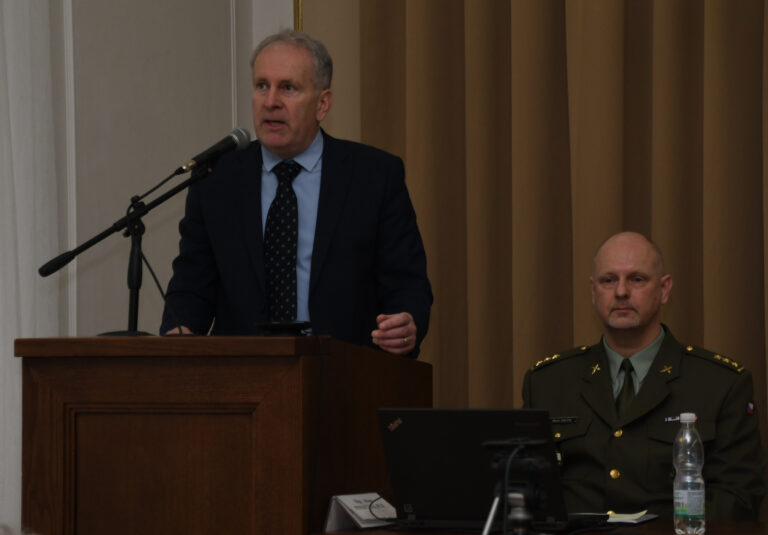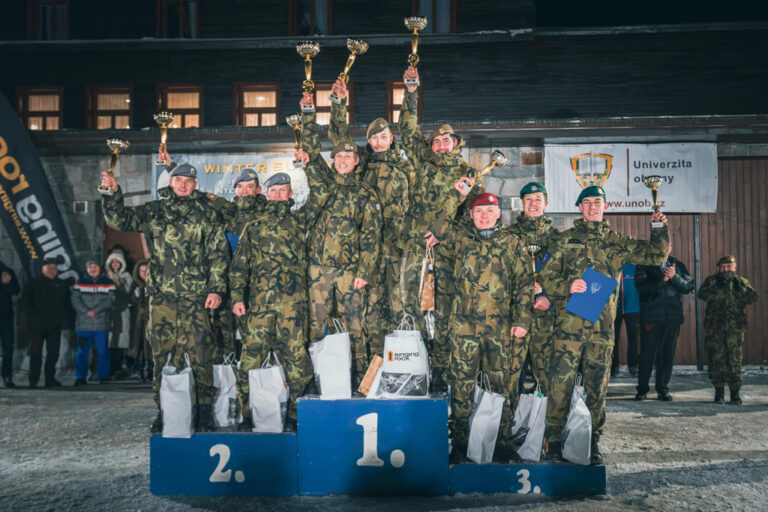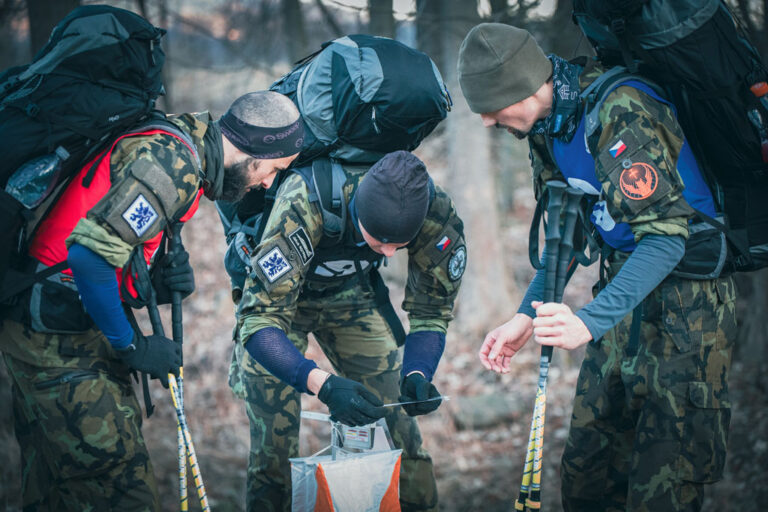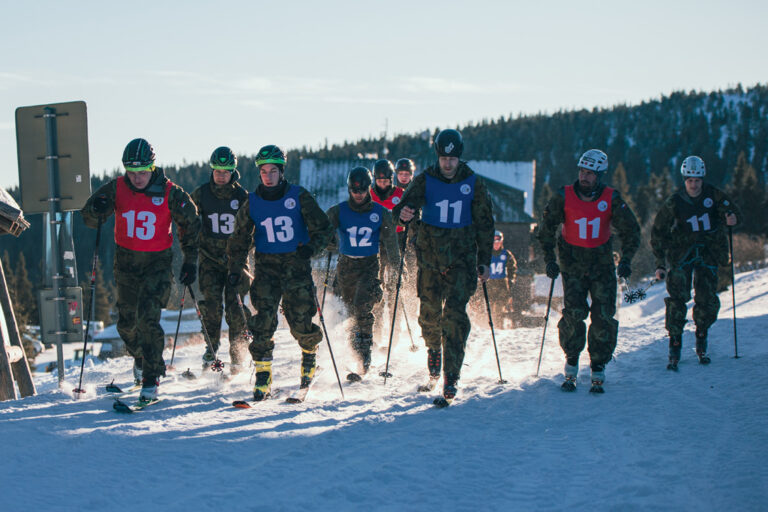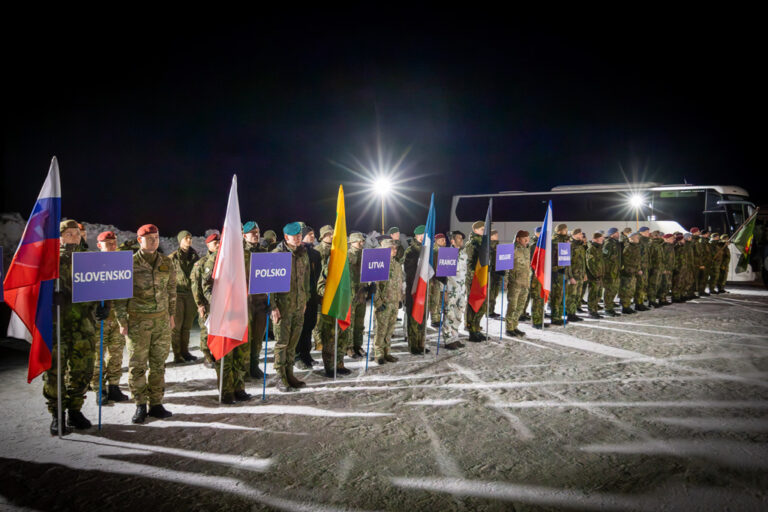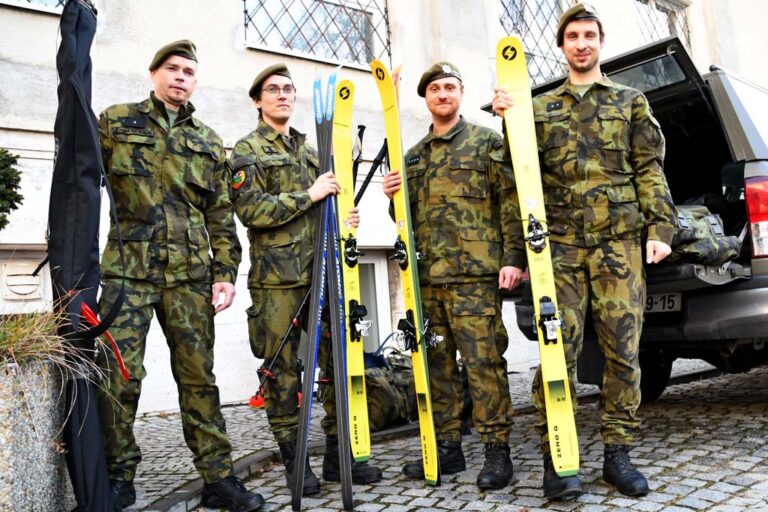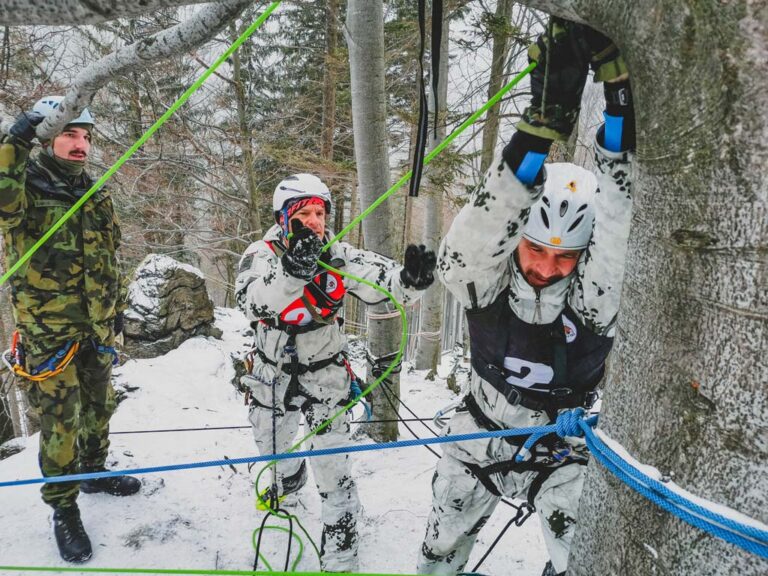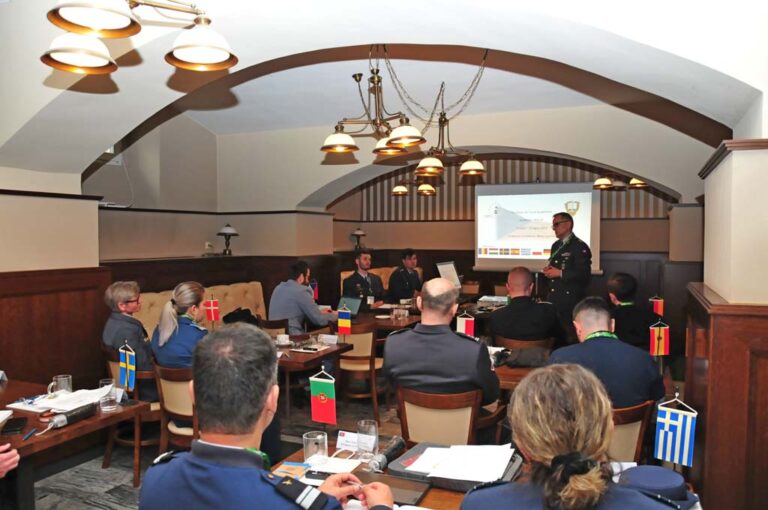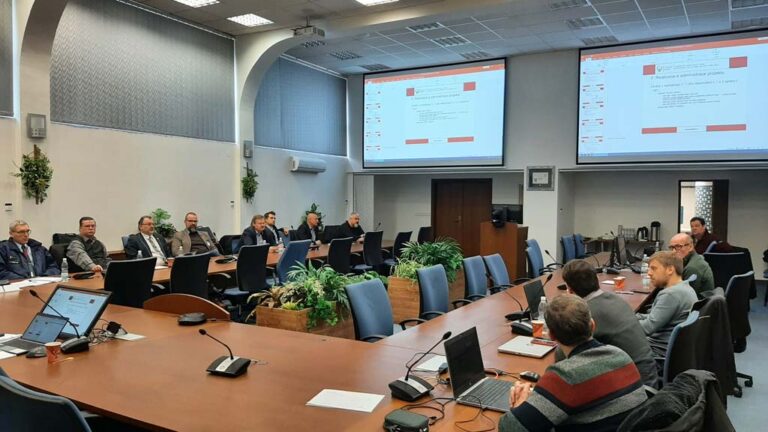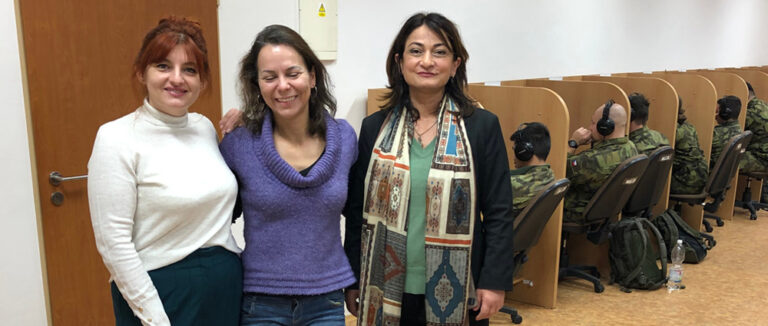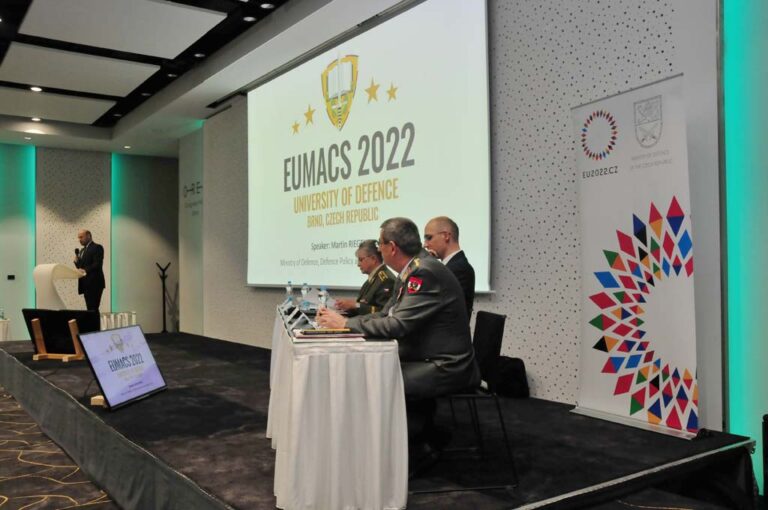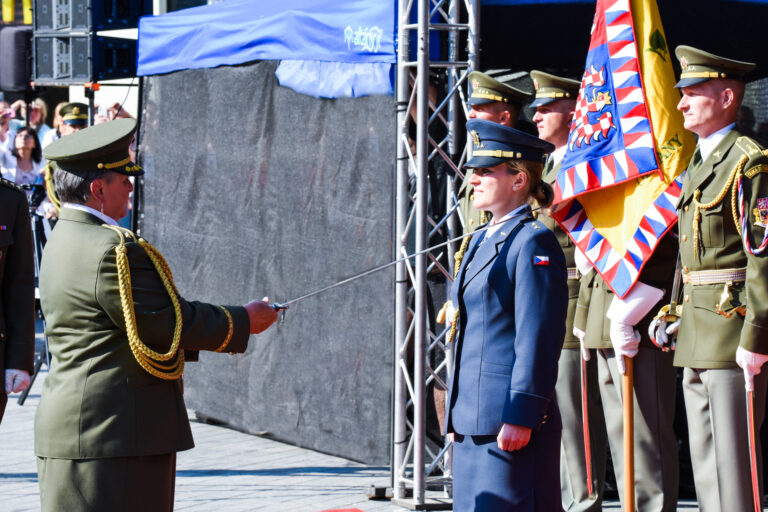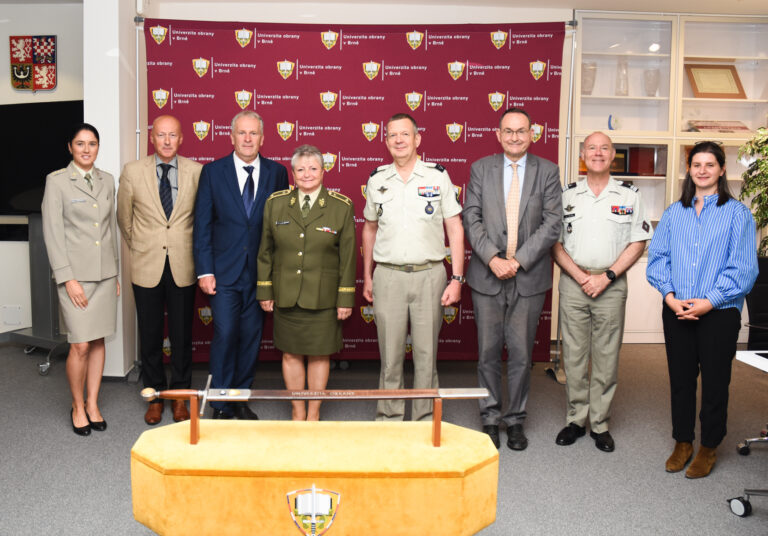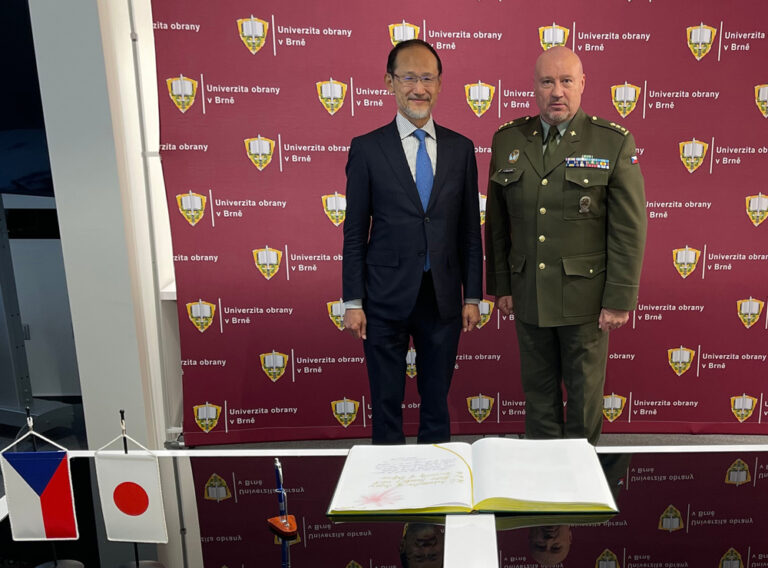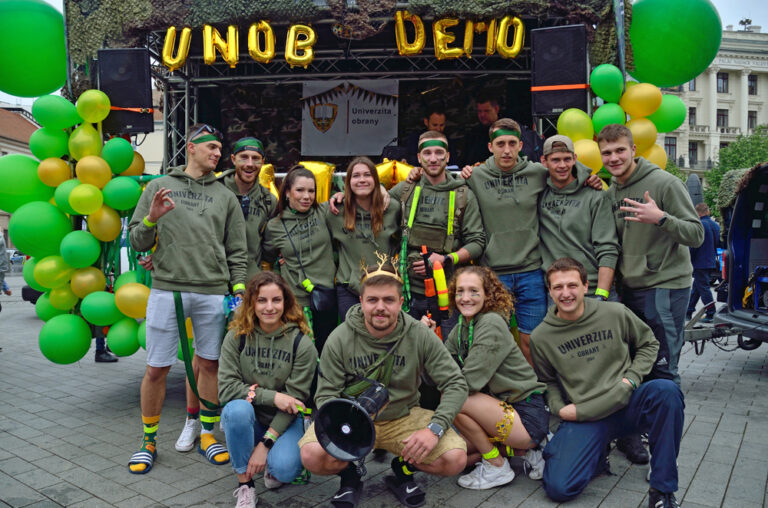This is how Lieutenant Ing. Kryštof Harant, this year’s top graduate of the Faculty of Military Leadership at the University of Defence, describes his life philosophy—one he fully embraced throughout his studies. He had the honor of representing all his fellow graduates during the official graduation ceremony held on Thursday, July 31. During the event, the Rector-Commandant of the University of Defence, Brigadier General Jan Farlík, ceremoniously touched Harant’s shoulder with a sword, formally marking the end of his studies at the military university. Bearing a name that evokes associations with a famous historical figure—especially among the middle and older generations—Lieutenant Harant is not, however, from Polžice or Bezdružice. He was born and raised in the city of Most, where he attended the multi-year Podkrušnohorské Gymnasium. During his penultimate year, he discovered the University of Defence at a university fair.“I’ve always gravitated toward physical activity, and I found out that this school integrates it as a significant part of the curriculum, which really appealed to me. In my final year, I decided once and for all that this was the right path,” Harant explains, referring to the decision that shaped his professional journey. Upon entering the university, Kryštof first had to come to terms with the fact that, alongside field exercises, academic study formed a significant part of the program.“From the range of specializations, I was most interested in artillery, considering the impact it has on the battlefield and the weapon systems it operates,” Lieutenant Harant says about his choice. His interest was further reinforced by information from upper-year students:“It’s a highly complex field. The outcome relies on many sub-units, such as fire support coordination units, fire control teams, fire support logistics, and others.” Following graduation, Lieutenant Harant will take up the position of fire control platoon leader in the artillery regiment stationed in Jince. He plans to settle in the Příbram region with his girlfriend, who he previously visited in Liberec. Given his life philosophy, he has a good chance of joining his dream unit soon—the Fire Support Coordination Battery. To achieve that, he will need to advance at least one rank higher in the command structure. One of the most challenging aspects of his studies, Kryštof recalls, was writing his diploma thesis, which focused on the ballistic preparation of an artillery unit and battery.He lacked prior experience in creating a work of such scope, as the five-year integrated master’s program did not include a bachelor’s thesis. In the end, however, he successfully identified certain deficiencies in ballistic preparation and described them in the context of the planned rearmament of the artillery forces. Kryštof fulfills his need for physical activity through sport—both individually and in team sports—and he also enjoys hiking. He relaxes by reading fantasy literature. Author: Viktor SlivaPhotos: Viktor Sliva and the personal archive of Kryštof Harant
At the end of July, first- and second-year students enrolled in the full-time military study program at the Military Faculty of Medicine of the University of Defence underwent continuous field training as part of the course Field Preparation. The aim of the training was to practically assess the physical readiness, psychological resilience, and professional skills of future military physicians and paramedics. The training included live-fire exercises and hand grenade throwing, which added a high degree of realism, closely approximating actual combat deployment conditions. The training content was differentiated based on the students’ year of study. First-year students focused on basic squad-level tactical tasks, terrain navigation, offensive and defensive maneuvers, and—most importantly—medical support of the unit in field conditions. This included casualty evacuation and the application of Tactical Combat Casualty Care (TCCC) principles. Second-year students concentrated on leading tactical operations at the platoon level, including combat in urban environments, planning and executing offensive and defensive operations, communications training in English, and advanced medical support. The program also included practical sessions on operations in contaminated environments and current lessons learned from international missions. “We were greatly pleased to observe the enthusiasm and dedication with which our students engaged in the training—even though it was an intense test of their capabilities. All tasks were carried out in ballistic vests and helmets, with their primary weapons at the ready, both day and night. The heightened tension and adrenaline were particularly evident during scenarios simulating real combat deployment,” said Lieutenant Colonel Mgr. Jaroslava Součková from the Department of Military Medical Service Organization and Management, who supervised the exercise. “As part of the field training, the students also fulfilled the requirements for live-fire practice with small arms and live hand grenade throwing,” she added. The students completed a total of 78 instructional hours, primarily conducted in the field and under the continuous command of instructors from the University of Defence training regiment and staff from the aforementioned department. The training not only enhanced their military and medical competencies but also tested their ability to operate effectively as a team under demanding conditions and stress. Author: Pavlína Šífová PospíšilováPhotos: Lt. Col. Mgr. Jaroslava Součková
The final punctuation mark on the recently concluded academic year came on Thursday, July 31st, in the afternoon and early evening, with the graduation ceremonies for graduates of military study programs. Academic dignitaries, graduating students, their family members, and loved ones gathered for this ceremonial event in the assembly hall of the Faculty of Electrical Engineering and Communication of Brno University of Technology, located under Palacký Hill. The graduations were held in four sessions—two from each of the University of Defence’s Brno-based faculties. First, graduates from the Faculty of Military Technology (FMT) received their diplomas and took the graduate’s oath. In his speech, the Dean of the faculty, Colonel GS Vlastimil Neumann, congratulated the students on completing their studies: “You have completed a demanding technical program at a unique faculty that connects science and research within a security-focused environment,” he stated, adding that the importance of technology in the military field is rapidly increasing. “Yet ultimately, it is always the human being who matters most—his values, decisions, and moral compass,” said Colonel Neumann, offering the graduates several pieces of advice for their upcoming lives as military professionals. The Dean of FMT, along with the Rector-Commandant Brigadier General Jan Farlík, presented awards to the top-performing students. Among them was Second Lieutenant Ing. Jan Mašek, who successfully represented the university in sports. At the recent Czech Academic Games, he defended his judo title in his category for the fourth consecutive year, achieving an admirable record—one gold medal for each year of participation. Looking back on his five years of study, Second Lieutenant Ing. Ondřej Severa—now a newly certified helicopter pilot—thanked the university staff and bid farewell to the school and his fellow students. The graduation ceremony of the sister Faculty of Military Leadership (FML) was even larger in scale. More than one hundred graduates received their diplomas from the hands of the Dean, including Second Lieutenant Ing. Kryštof Harant, who earlier that day had symbolically represented all his fellow graduates during the formal commissioning ceremony. “Out of all the specialization options, I was most drawn to artillery because of its impact on the battlefield and the types of weapons systems it involves,” explained Second Lieutenant Harant, speaking about his choice of specialization during the preparation of an upcoming article that will offer a closer look at this top graduate. In his address, the Dean of FML, Colonel GS Jan Drozd, also focused on the moral dimension of a commanding officer’s personality:“In life—and especially in military life—you will face moments where you must choose between what is easy and what is right. It is in these moments that your true character will be revealed. Remember—fortune favors the brave! Congratulations, and I wish you courage, wisdom, and good fortune—not only as commanders but also as people who will inspire others to be better.” Author: Viktor Sliva | Photos: author
A total of 193 current students of the University of Defence (UO) today ceremoniously completed their studies at the only military university in the country. The graduation ceremony for the graduates of the Brno faculties of UO took place at Freedom Square in Brno. Among the graduates, within the Faculty of Military Leadership, the most represented specializations were Military Logistics and Commander of Mechanized and Tank Units, while at the sister Faculty of Military Technology, these were Military Pilot, Cybersecurity, and Combat and Special Vehicles. Graduates from a broad range of other specializations meet the current needs of the Czech Army. Including graduates of the Military Faculty of Medicine, who completed their studies earlier, the University of Defence expanded the ranks of the Czech Armed Forces by a total of 220 new officers in the just-ended academic year. Alongside representatives of the Ministry of Defence, the most significant event of the academic year at UO was also attended by Pavel Fischer, Chairman of the Senate Committee on Foreign Affairs, Defence and Security of the Parliament of the Czech Republic; Jana Mračková-Vildumetzová, member of the same committee; other members of the Defence Committee of the Chamber of Deputies; representatives of state administration and self-government bodies; representatives of defense industry companies and universities; among them a foreign guest – Brigadier General Aurel Sabó, Rector of the Academy of the Armed Forces of General Milan Rastislav Štefánik in Liptovský Mikuláš. The highlight of today’s ceremony was the commissioning of graduates by this year’s best student, Lieutenant Ing. Kryštof Harant. The Rector-Commandant placed the university insignia in the form of a sword on his shoulder. “After years of joint work, demanding exams, morning roll calls, trainings, and long evenings spent with textbooks and scripts, the moment has come when we reap the fruits of our effort,” Lieutenant Harant stated on behalf of all graduates. He himself and eight other students of the Brno faculties of UO were rewarded with material and monetary gifts for their academic results and exemplary fulfillment of service duties during their studies. This year’s graduates, including 16 pilots, were twice saluted from the cockpits of their aircraft during the ceremony. First, a trio of Mi-171 helicopters flew over Freedom Square. At the time the fresh graduates conducted their final ceremonial march, the roar of jet engines from Jas-39 Gripen fighters echoed above the center of Brno. The definitive end of their university studies was marked by the tossing of caps into the air. Immediately afterwards, it was time for congratulations from former colleagues, family members, and loved ones. The military graduation ceremony is followed in the afternoon and evening by its academic counterpart. The program includes five rounds of graduations during which graduates receive university diplomas and take the academic oath. The ceremonial event in the heart of the university’s seat city began with a report from the commander of the training regiment to the First Deputy Minister of Defence, František Šulc, who then thanked the graduates in his speech for choosing to serve their country: “I highly appreciate that you have combined your interest in education precisely with the defence of the Czech Republic.” Lieutenant General Miroslav Hlaváč, First Deputy Chief of the General Staff of the Czech Armed Forces, added his perspective on the role of a soldier as a commander: “An officer is not defined by rank, but by attitude. The attitude under stress, uncertainty, and pressure to withstand with honour.” The Rector-Commandant of the University of Defence, Brigadier General Jan Farlík, recalled some circumstances that marked the period of study for this year’s graduates, such as the COVID-19 pandemic and last year’s floods, in which students demonstrated precisely those good qualities the school wants to develop in its students. “Do not forget your alma mater and share your experience with it in the future, because those who come after you will need it,” General Farlík said in farewell to the departing students. Author: Viktor SlivaPhotos: Viktor Sliva, Aleš Mylan, Petr Pechar
Their new sixteen colleagues in the ranks of the Air Force personnel, along with nearly two hundred other graduates of the Brno faculties of the University of Defence, will be greeted on Thursday, July 31, by military aircraft pilots flying over Freedom Square in Brno during the graduation ceremony. Shortly after the event begins at half past eight, and after greetings from the rector-commandant Brigadier General Jan Farlík and the 1st Deputy Minister of Defence František Šulc, combat helicopters will fly over the assembled units. The roar of the jet engines of Gripen aircraft will then resonate over the square during the final march. This year, a total of 220 successful graduates from the University of Defence are leaving for units, of whom 193 studied at the Brno faculties. It is these graduates who will be ceremonially commissioned on Thursday, July 31, as part of a ceremony traditionally held in the central square of the university’s seat city — Brno’s Freedom Square. The core of the ceremony is the commissioning of the graduates by the best student of the Faculty of Military Leadership — Lieutenant Kryštof Harant. For the first time in his function this year, the rector-commandant of the University of Defence, Brigadier General Jan Farlík, will place the university insignia in the form of a sword on his shoulder. Honored guests will attend the ceremonial commissioning of the graduates of the only military university in the Czech Republic — 1st Deputy Minister of Defence František Šulc, 1st Deputy Chief of the General Staff of the Czech Army Lieutenant General Miroslav Hlaváč, and the State Secretary in the Ministry of Defence, represented by Dr. Jaroslav Daněk. The ceremony will also be attended by, among others, the Chairman of the Foreign Affairs, Defence and Security Committee of the Senate of the Parliament of the Czech Republic Pavel Fischer, member of this Senate committee Jana Mračková-Vildumetzová, Chairman of the Defence Committee of the Chamber of Deputies Lubomír Metnar, and a foreign guest — Rector of the General Milan Rastislav Štefánik Armed Forces Academy in Liptovský Mikuláš Brigadier General Aurel Sabó. Among the graduates of the Faculty of Military Leadership, the most represented specializations are Military Logistics and Commander of Mechanized and Tank Units. At the sister Faculty of Military Technology, these are Military Pilot, Cybersecurity, and Combat and Special Vehicles. The ceremony will begin with the report of the parade commander to the 1st Deputy Minister of Defence. Then three Mi-171 helicopters will fly over Freedom Square. After the opening speeches of the 1st Deputy Minister of Defence, the 1st Deputy Chief of the General Staff, and the rector-commander of the University of Defence, the symbolic act of commissioning the graduates will take place through the best graduate of the Faculty of Military Leadership, Lieutenant Ing. Kryštof Harant. During the final ceremonial march, JAS 39 Gripen fighter jets will fly over the units. This year, the ceremony will culminate, as tradition dictates, with the graduates throwing their caps into the air as a symbolic conclusion of their studies. In the afternoon and evening hours, a second ceremonial moment connected with the end of studies will follow, this time in an academic spirit. A total of five graduation sessions will take place in the FEKT VUT auditorium under Palacký Hill. Author: Viktor Sliva, photos: author and illustrative archival footage from 2024
On Saturday, July 19, 2025, the jubilee 10th annual summer children’s camp “Treasures at Prýgl 2025,” organized by the Trade Union Organization ČMOSA at the University of Defence, came to an end. With the base at the University of Veterinary and Pharmaceutical Sciences Kníničky, we enjoyed a week full of competitions, fun, and great experiences. On Monday, the children competed in the camp’s Olympic games, swam in the reservoir, and had the chance to try rafting on the “Brno sea.” On Tuesday, we visited a ranch in Moravské Knínice, where the children rode horses. The following day, Wednesday, we toured the studios and workshops of Czech Television Brno in the morning. An interesting and educational afternoon visit to the traffic playground of the Brno Municipal Police followed, where the children deepened their skills and habits as road users—they could rent bikes or scooters, and at another station, they learned how to behave around the visually impaired and how to assist them when walking through the city. It wouldn’t be a camp for children of Ministry of Defence employees without some “military” offering in the program. The commander of the mechanized battalion in Bučovice kindly accommodated us, and on Thursday we spent an interesting morning with the children there. Selected military equipment was stationed at the military unit’s platform—from a mobile ambulance to infantry fighting vehicles—which the children explored with great interest, especially from the inside. They also tried handling weapons—from pistols to shotguns. At another station, Bučovice soldiers prepared several competitions for the children, and after completing all tasks, the children received small gifts from the soldiers. The children were probably most looking forward to Friday evening. After dinner, the dining hall transformed into a cultural center of Kníničky. All three groups presented their rehearsed performances as part of the program “Group entertains group.” And then it began—a great disco with light refreshments. When the time for lights-out came, the children were not very willing to go to their beds. We believe the children enjoyed the camp program and had a week full of interesting activities with us. It is also very important to us that all children returned safely to the arms of their parents. The camp’s evaluation would not be complete without thanking the University of Defence leadership for logistical support, which created excellent conditions for the successful organization of the camp at very favorable financial terms for the participants’ parents. Author: Iva Taušová on behalf of the organizers of the summer children’s camp
Assessment of Clothing Comfort for Taiwanese Soldiers in the Laboratory of the University in Hsinchu
A daily temperature of 35 °C in the shade, 90% humidity, clear to partly cloudy skies, a 6-hour time difference, high traffic density, a diverse and rugged landscape, an inspiring research atmosphere, and a friendly and welcoming environment — these are the conditions that characterized the business trip to Taiwan undertaken from July 13 to 20 by Captain Jana Švecová from the Faculty of Military Leadership and Professor Luboš Hes from the Technical University of Liberec. The visit took place within the framework of a project supported by the Technology Agency of the Czech Republic, titled „Portable Modular MoCap System for Recording and Evaluating the Condition of Armed Forces and Rescue Service Personnel“ (Project Code: TM05000017). The project focuses on developing an innovative solution for collecting data on physical performance and condition of security force specialists. The team was hosted at the ergonomic motion capture laboratory of the Department of Industrial Engineering and Management at National Tsing Hua University in Hsinchu by Professor Yun-Ju Lee, one of the leading Taiwanese investigators of the MoCap project. She also consulted on the project’s progress and results and took a keen interest in the issue of optimizing soldier clothing comfort. As part of a specific task within the project, subjective assessments of clothing comfort were carried out with Taiwanese soldiers during controlled physical activities while wearing military load-bearing equipment. Additionally, objective measurements of the textile materials used in local military uniforms were conducted under defined laboratory conditions using the Permetest device. Among the key outcomes of the evaluation was the determination of the vapor permeability and thermal resistance values of Taiwanese field uniform materials, in both dry and wet states, for the purpose of calculating the critical overheating threshold of the human body. The results will be used for evaluating the current TAČR project and for developing a follow-up project strategy. In addition to the Taiwanese research team, the project also includes the Faculty of Military Leadership (FVL) and the Faculty of Military Technology (FVT) of the University of Defence, as well as the Czech Technical University in Prague (CTU). Author: Viktor SlivaPhoto: Jana Švecová
Colonel Petr Hlavizna, as the University of Defence vice-rector for external relations and internationalisation attended the ceremony of passing the commanding position of the 53rd reconnaissance and electronic warfare regiment held in Opava on 22nd July 2025. Land Forces Commander major general Josef Trojanek gave the unit colours to the hands of colonel Ivan Mahr who replaced in the position leaving commander colonel Petr Molinsky. “The 53rd regiment clearly relies on people, expertise, and professionalism, and we usually have very experienced people who have experience from deployments in overseas operations or completed courses abroad,” said Colonel Mahr in an interview with Czech Television. He considers the position he has just taken on as the pinnacle of his professional career. The primary mission of the General Heliodor Píka 53rd reconnaissance and electronic warfare regiment of is combat support executed in the areas of intelligence, reconnaissance and surveillance, electromagnetic warfare, and geographic and hydrometeorological service. Effective work with information is currently one of the critical capabilities of every armed forces and is essential for the effective conduct of military operations. However, it would be impossible without the use of the entire spectrum of sophisticated technologies, modern military equipment, and the wide range of information and communication systems, as well as soldiers, in whose professional and career training the University of Defence also participates. Visitors to Tuesday’s ceremony in Opava’s square could also see on display several examples of cutting-edge technology used by the 53rd regiment, such as the STARKOM jammer, the TITUS communications vehicle, modern drones, and weapons and equipment used by the reconnaissance units. Author: Viktor Sliva, photo: facebook.com/53pPzEB/
The running team representing the University of Defence in the Army Running League has claimed victory in all four races held so far in the unit team category and currently leads the standings. After finishing second overall last year, the team is well on track to achieve its goal of becoming this year’s overall winner. Rankings in each round are based on the total points earned by the five best runners in individual age categories. “This year, we’ve strengthened the team with first-year students, and this new generation is really making us proud,” says Major Viktor Novotný from the Centre for Physical Education and Sports, who also serves as the team’s ambassador. Among the standout new additions to the men’s category are Privates Jakub Farský, Jan Horn, and Ondřej Lemberka. In the women’s category, Private Magdaléna Cetlová has been excelling alongside Sergeant Jana Dohnálková — the two consistently win their races, leaving little room for their rivals. In the most recent race of the series — held on July 17 in Náměšť nad Oslavou, following earlier events in Brno, Jince, and Opava — the university team was boosted by its most successful athlete, Sergeant Michal Hroch. He secured 1st place and continued his strong season, having recently won the 800 m and placed second in the 1500 m at the Czech Academic Games. In the women’s race, Sergeant Jana Dohnálková was the overall winner, also setting a new course record. Last year’s overall women’s champion, Corporal Šárka Somrová, is unfortunately unable to participate in this year’s Army Running League due to academic commitments and health issues. The team wishes her a speedy recovery and a smooth return. The UO running team, currently composed of about thirty active members, looks ahead to the second half of the season with upcoming league races in Stará Boleslav, Bechyně, Lipník nad Bečvou, Přáslavice, and the November finale in Prague. They also plan to take part in the VOKOLOPRIGLU 2025 race, which rewards participants with scenic views of the “Brno Sea,” Veveří Castle, and the autumn-colored Podkomorské Forests. Other active movement enthusiasts are welcome to join as well. Author: Viktor SlivaPhoto: Viktor Novotný
On 14 July 2025, Brigadier General Jan Farlík, Rector-Commandant of the University of Defence, attended a ceremonial event at the 22nd Helicopter Air Base in Náměšť nad Oslavou, marking the official change of command. The new commander, Colonel (GS) Petr Slíva, succeeded Brigadier General Rudolf Straka, who is retiring to the reserve after more than thirty years of service in the Armed Forces. The ceremony was attended by high-ranking representatives of the Czech Armed Forces, the Ministry of Defence, the Embassies of the Slovak Republic and the United Kingdom, families of war veterans, and other distinguished guests. As part of the event, the 85th anniversary of the founding of the legendary 311th Czechoslovak Bomber Squadron of the RAF was commemorated. In its honour, a new memorial was unveiled on the base grounds, accompanied by an exhibition titled “Three-One-One”. The exhibition pays dignified tribute to the legacy of the Czechoslovak airmen in the Royal Air Force. The memorial was designed by academic painter Pavel Holý, with artistic blacksmith Pavel Tasovský contributing to its creation. The project received significant support from the Military History Institute in Prague and defence industry partners. In his first speech as commander, Colonel (GS) Slíva emphasized the strong sense of responsibility with which he assumes his new role. His priorities will include the introduction of new technologies and tactical procedures, as well as a strong focus on training and personnel development. “Human potential is the most valuable asset the army has. I want everyone here to feel good and find meaning in their service,” said Slíva. The ceremonial day at the 22nd base thus became not only a symbolic passing of command but also a powerful reminder of the heroism, traditions, and values upon which the Czech Army builds its identity and future. Photo: Cpl. Mgr. Sára TomkováAuthor: Lucie Sedláková
The University of Defence celebrates a remarkable achievement thanks to the outstanding performance of student and cadet Martin Kubíček, who claimed the title of Academic Champion of the Czech Republic in rowing. The Czech Academic Rowing Championship (AMČR) took place on 12–13 July 2025 in Třeboň. Due to fewer than seven athletes registering in the men’s single sculls category, the final race was held exceptionally on Sunday, 13 July only. The race began with an unexpected setback. “I planned to gain an early lead and hold it to the finish, but during my first stroke I caught a crab and came to a full stop. I then had to make up about 150 meters to catch the rest of the field,” Martin Kubíček recalls the dramatic start. His determination quickly turned the tide. “Once I caught up, I overtook the field over the next 300 meters and continued with my own pace,” he adds. Kubíček ultimately crossed the finish line 13 seconds ahead of runner-up Šanda. “I tried to push hard throughout the race, but after building a solid lead, I just controlled the final stretch and secured first place. The event was well-organized again this year, the weather was nice, and I’m satisfied with the result,” says the new national champion. Academic rowing races are contested over 1000 meters, half the distance of standard regattas. A strong and consistent performance from the very first strokes is therefore crucial. Martin Kubíček demonstrated not only excellent physical conditioning, but also resilience and the ability to respond to race adversity. Congratulations on becoming the 2025 Academic Champion of the Czech Republic, and thank you for proudly representing your alma mater – the University of Defence. The Czech Association of University Sports (ČAUS) is the umbrella organization for university-level sport in the Czech Republic. It coordinates national university championships (AMČR), supports student athletic activities, and ensures Czech representation at international events such as the World University Games. ČAUS is a member of both FISU (International University Sports Federation) and EUSA (European University Sports Association). Photo: Martin KubíčekAuthor: Lucie Sedláková
Over two hundred students enrolled in the five-year military study programs at the Brno-based faculties of the University of Defence have met the necessary conditions to defend their final theses and demonstrate the knowledge acquired throughout their studies by passing the State Final Examination. At the Faculty of Military Leadership, these examinations are being held from Monday, July 7, to Thursday, July 17, with 115 students appearing before the examination boards. The largest groups are from the specializations in Military Logistics (28) and Command of Mechanized and Armored Units (16). At the Faculty of Military Technologies, the State Final Examinations took place earlier this week. Among the total of 87 candidates, the most represented specializations were Military Pilot (16), Cybersecurity (13), and Combat and Special Vehicles (12). Students who successfully pass the final exams will experience two ceremonial milestones on the last day of July. The first is the traditional military commissioning ceremony, which has become customarily held in the heart of the university’s host city – Brno’s Freedom Square (náměstí Svobody). The commissioning ceremony will be attended by senior representatives of the Ministry of Defence, the Czech Armed Forces, and regional administration. The Chief of the General Staff of the Czech Armed Forces will be represented by First Deputy Chief of the General Staff, Lieutenant General Miroslav Hlaváč, and the Ministry of Defence’s State Secretary will be represented by Dr. Jaroslav Daněk. Other distinguished guests include the Chairman of the Senate Committee on Foreign Affairs, Defence and Security, Pavel Fischer, the Chairman of the Chamber of Deputies‘ Defence Committee, Lubomír Metnar, and an international guest – Brigadier General Aurel Sabó, Rector of the Armed Forces Academy of General Milan Rastislav Štefánik in Liptovský Mikuláš. They will observe the highlight of the ceremony from the grandstand – the symbolic commissioning of graduates, conducted by the top-performing student of the Faculty of Military Leadership. For the first time, the university insignia, represented by a ceremonial sword, will be placed on the graduate’s shoulder by Brigadier General Jan Farlík, Rector-Commandant of the University of Defence. The final part of the ceremony will feature a celebratory parade by the graduating units, during which they will be saluted by military helicopters and Gripen fighter jets in a flyover. As in previous years, the anticipated climax of the commissioning ceremony will be the traditional tossing of caps into the air – a symbolic conclusion to the graduates’ academic journey, followed by congratulations from fellow students, family members, and friends. In the afternoon and early evening, the second ceremonial event marking the end of studies will take place – this time in a strictly academic setting. A total of five graduation ceremonies will be held in the auditorium of the Faculty of Electrical Engineering and Communication at Brno University of Technology, located on Palacký Hill. Text by Viktor Sliva; photos by the author and archival images from 2024
On July 10, 2025, the University of Defence was honored by the visit of the Deputy Minister for Science, Research, and Innovation, Mgr. Jana Havlíková. The purpose of the meeting was to familiarize the Deputy Minister with the research and innovation potential of the University, its key projects, and the challenges it faces in their implementation. The Deputy Minister was welcomed by the Rector-Commandant of the University of Defence, Brigadier General Jan Farlík, who, in his opening remarks, emphasized the importance of research and development activities carried out by the University’s teams to meet the needs of the Armed Forces of the Czech Republic and to support international defence cooperation. The meeting was also attended by Vice-Rector for Strategy and Development, Lieutenant Colonel Zdeněk Pokorný; Vice-Rector for External Relations and Internationalization, Colonel (General Staff) Petr Hlavizna; Vice-Rector for Scientific and Expert Activities, Professor Vanda Boštíková; Dean of the Faculty of Military Leadership, Colonel (General Staff) Jan Drozd; and Vice-Dean for Research at the Faculty of Military Technologies, Lieutenant Colonel Jiří Štoller. Key topics discussed during the meeting included the involvement of academic staff from the University of Defence in both national and international research projects. Particular attention was paid to the limitations in accessing certain grant schemes due to the specific nature of defence-related research. Representatives of the University of Defence also highlighted the need to establish flexible support instruments that would enable more active and equitable participation of military researchers and educators in research and development activities. Deputy Minister Havlíková expressed her understanding of the specific conditions of defence research and pledged to seek systemic solutions that would provide targeted financial and institutional support to military personnel engaged in academic work. At the conclusion of her visit, the Deputy Minister toured selected research and technological facilities at the University of Defence, where she was introduced to specific projects in the areas of military technologies, defence systems, and security research, all of which demonstrated a high potential for practical application. Photo: Lucie Sedláková Author: Lucie Sedláková
Brno, 10 July 2025 – Officer Cadet Arnošt Stelšovský, a first-year student in the Bachelor’s degree programme Military Flight Operations, specializing in Military Performance Pilot, received an award from the Rector-Commandant of the University of Defence, Brigadier General Jan Farlík. The award recognized Stelšovský’s exceptional representation of the University at the international aviation competition Czech Microlight Open 2025. “It’s a tremendous honour for me,” said Stelšovský as he accepted the award. “When the chairman and I asked for permission to attend the competition, I never expected to be approved – and certainly not to receive such strong support from the University. I truly appreciate it.” The second edition of the Czech Microlight Open, held from 1–6 July 2025 at the Jaroměř airfield, is a prestigious event in the field of microlight aircraft navigation. Arnošt Stelšovský stood out in a highly competitive field, securing third place overall in the single-seat aircraft category. He also received the special award for Best Young Pilot, granted to the top competitor under the age of 25. This competition marked Stelšovský’s debut in major international competition. “It was my first larger-scale international event, which also served as the national championship. The competition lasted several days and was divided into several disciplines – for example, precision landings and fuel efficiency, where fuel consumption is evaluated and penalties are awarded for deviations.” One of the key challenges was navigating in unfamiliar terrain. “Some of the more demanding navigation routes are partially known in advance, while the rest must be constructed during flight using ground reference points. Flying in pairs helps, because the tasks can be split. But when I’m alone in the cockpit, it’s hard to decide what to grab first – the ruler or the aircraft controls. I only have two hands, but in moments like that, four would be better.” For his performance, Stelšovský has been nominated to represent the Czech Republic at the 19th FAI World Microlight Championship, which will take place from 9–15 August 2025 in Chambley, France. This is the most prestigious event in the sport, where the world’s best microlight pilots will compete. Rector-Commandant Brigadier General Jan Farlík praised not only Stelšovský’s sporting achievements, but also his professional commitment. “I greatly value the fact that our students are increasingly engaging in such activities, thereby raising not only their own reputation and that of the University of Defence, but also that of the Czech Republic. Officer Cadet Stelšovský proves that even first-year students can achieve internationally recognized results. I wish him the best of luck at the competition in France.” The University of Defence extends its heartfelt congratulations and wishes him many more safe take-offs and landings – and in August, favourable winds over France. Photos: Karolína Pecharová, Lucie SedlákováAuthor: Lucie Sedláková
Brigadier General Jan Farlík, Rector-Commander of the University of Defence, was invited by Lieutenant General (Ret.) Marek Tomaszycki, Rector of the General Tadeusz Kościuszko Military University of Land Forces (AWL) in Wrocław, to attend the graduation ceremony of this prestigious military academy. Representing the University of Defence at the ceremony was Colonel General Staff Petr Hlavizna, Vice-Rector for External Relations. This year, a total of 493 new officers were commissioned as second lieutenants—graduates of the five-year military study program as well as participants of the officer course for non-commissioned officers. The graduation ceremony was attended by representatives of the Armed Forces of the Republic of Poland, academic institutions, families and friends of the graduates, as well as hundreds of citizens who came to support the newly commissioned officers. The University of Defence wishes all the fresh graduates great success in their military careers. The leadership of the University of Defence and the Military University of Land Forces are currently exploring and discussing potential areas for future cooperation. This partnership would enable both institutions to engage in military education and training, research activities, and the exchange of experience—not only among academic staff but also among students. The Akademia Wojsk Lądowych im. gen. Tadeusza Kościuszki (AWL) in Wrocław is a prestigious educational institution that trains future officers and specialists for the needs of national defence. It offers both military and civilian study programs and ranks among the most sought-after military universities in Poland. Photo: Online Author: Lucie Sedláková
On Monday, July 7, Brigadier General Jan Farlík, Rector-Commandant of the University of Defence, attended the farewell address of outgoing Polish President Andrzej Sebastian Duda, held at the CEVRO University Auditorium in Prague. President Duda accepted the invitation from the Centre for Transatlantic Relations (PCTR) and participated in a debate titled „Central Europe on the Threshold of a New Epoch.“ The discussion with the president was moderated by National Security Advisor Tomáš Pojar. In his speech, Andrzej Duda reflected on more than two decades of public service, recalled his political beginnings, and spoke about the inspiration he drew from the late President Lech Kaczyński. He spoke openly about his conservative values, the importance of balanced regional development, and the necessity of international cooperation—particularly through formats such as the Visegrád Group, the Bucharest Nine, and the Three Seas Initiative. Brigadier General Jan Farlík, Rector-Commandant of the University of Defence, commented on his participation in the debate:„Meeting with President Duda was a valuable opportunity to hear the views of a politician who has long influenced the security landscape of Central Europe. The University of Defence supports international dialogue and the connection between academic and strategic perspectives on current challenges.“ Photo: CEVRO UniversityAuthor: Lucie Sedláková
Building on the successful cooperation between the University of Defence and the General Jonas Žemaitis Military Academy of Lithuania, the next edition of the scientific conference Challenges to National Defence in Contemporary Geopolitical Situation (CNDCGS)—held in 2024—will be hosted in Brno on 8–10 September 2026. The conference will be indexed in the Scopus database. As part of the effort to deepen mutual collaboration, a working visit to Lithuania will take place in 2025. During the visit, the Rector-Commander of the University of Defence, Brigadier General Jan Farlík, will meet with representatives of the Lithuanian academy to discuss the strategic direction of joint activities. The visit will also include a formal signing ceremony of a memorandum of cooperation, which will officially affirm the continuation and further development of the partnership in research, education, and the organization of professional conferences. As part of expert cooperation activities, the University of Defence has already been represented by the Vice-Rector for Education and Student Affairs, Associate Professor Marek Sedlačík. During his visit, he met with Colonel Ričardas Dumbliauskas, Commander of the General Jonas Žemaitis Military Academy, and General Valdemaras Rupšys, Chief of the General Staff of the Lithuanian Armed Forces. The CNDCGS 2026 conference programme will also feature a dedicated section for PhD students, aimed at supporting young researchers and providing a platform for the presentation of their work. The best paper in this section will be awarded by a professional jury. In this way, the conference will once again confirm its status in 2026 as a prominent international platform for the exchange of knowledge and the strengthening of defence cooperation in the context of the current geopolitical situation. Photo: Marek SedlačíkAuthor: Lucie Sedláková
On Wednesday, July 2, 2025, Brigadier General Jan Farlík, Rector–Commandant of the University of Defence in Brno, participated in the expert workshop “Quantum Computing at the Academy of Sciences 2025”, held at the Institute of Scientific Instruments of the Czech Academy of Sciences (AV ČR). The event brought together leading Czech scientists, researchers, academics, and technological partners to discuss the future of quantum technologies in the Czech Republic. Organized under the leadership of Professor Josef Lazar, the workshop was initiated by the Vice President of the Czech Academy of Sciences, Ilona Müllerová, and underscored the importance of cooperation between the scientific and defence sectors in the field of advanced technologies. The workshop also welcomed representatives from several institutes of the Czech Academy of Sciences, experts from the Czech Technical University (CTU), IBM and ITS companies, and partners from the newly established Quantum Innovation Centre (QIC-Czech), which connects academic research with practical applications in the area of quantum computing. Thanks to support from the Ministry of Defence, the University of Defence, and the technical infrastructure of CTU, consortium members have access to cutting-edge IBM quantum computers – including the Eagle quantum processor with 127 qubits – and can use them for both research and the education of a new generation of specialists. The workshop program included expert lectures on the principles and applications of quantum computing, discussions on research directions, and a tour of the state-of-the-art laboratories at the Institute of Scientific Instruments of the Czech Academy of Sciences focused on advanced quantum technologies. “For the University of Defence, it is essential that our students and young professionals have access to the most advanced technologies, including quantum computers. Only in this way can we prepare a new generation of experts capable of facing future challenges and strengthening the defence capabilities of the Czech Republic in the digital era,” said Brigadier General Jan Farlík, Rector–Commandant of the University of Defence. The workshop confirmed that ensuring the defence and security of the Czech Republic requires a systematic connection of top capacities in science and research, thereby enabling the continuous development and application of state-of-the-art quantum technologies. Photo: isibrno.czAuthor: Lucie Sedláková
On Friday, July 4, Brigadier General Jan Farlík, Rector-Commandant of the University of Defence, personally attended the graduation ceremony for master’s degree graduates of Armed Forces Academy of general Milan Rastislav Štefánik (AOS) in Liptovský Mikuláš. The significance of the event was further emphasized by the personal presence of the President of the Slovak Republic, Peter Pellegrini, who attended the ceremony in his capacity as the Commander-in-Chief of the Slovak Armed Forces. In his emotional speech, President Pellegrini praised the courage and values of the young officers who chose to dedicate their lives to serving their homeland. He especially highlighted their decision to study at an exceptional and prestigious military university, which holds an irreplaceable role in shaping the Slovak Republic’s Armed Forces. He also drew attention to the growing global security threats and the need for well-prepared officers. He stressed that the true strength of the armed forces lies not only in technology, but above all in the people – the men and women in uniform whose professionalism and commitment safeguard the nation’s security. This year, 92 students successfully completed their studies at AOS, including 22 women, across four academic programs: Security and Defence of the State, Electronic Weapons Systems, Military Communication and Information Systems, and Weapons Systems, Weapons and their Components. The graduation ceremony took place on the academy’s parade ground, where the academy’s rector, Brigadier General Aurel Sabó, formally commissioned the graduates as second lieutenants. The Rector’s Award was presented to Second Lieutenant Mgr. Terézia Lišková, a graduate of the Security and Defence of the State program, who received a replica of the military university insignia as a symbol of outstanding academic achievement. The ceremony was attended by other prominent representatives of public, military, and academic life, including officials from the Slovak Ministry of Defence, the General Staff of the Slovak Armed Forces, local government, the chaplaincy of the Slovak Armed Forces, and the military diplomatic corps accredited in the Slovak Republic. On the occasion of the ceremony, Brigadier General Jan Farlík expressed his respect and support for the new graduates of the allied academy. The University of Defence wishes the graduates of Armed Forces Academy of general Milan Rastislav Štefánik much success in their future careers as professional soldiers and looks forward to continued cooperation in the fields of science and education. Photo: R-CAuthor: Lucie Sedláková
108 Years Since the Battle of Zborov: Tribute to the Courage of Czechoslovak Legionnaires in Blansko
On July 2, 2025, a commemorative event marking the 108th anniversary of the Battle of Zborov took place in Blansko, in the park near the statue of an attacking legionnaire on Svatopluk Čech Street. The memory of the Czechoslovak legionnaires was honored by the Vice-Rector of the University of Defence, Colonel General Staff Petr Hlavizna; the Mayor of Blansko, Engineer Jiří Crha; the Deputy Mayor, Mgr. Lenka Dražilová, MBA; Dr. Jan Kux, Chairman of the Czechoslovak Legionary Community (ČsOL) – Brno 2; the Chairman of ČsOL – Brno 1, retired Colonel Eng. Jaroslav Jarolím; and other members of the University of Defence’s partner associations, as well as the general public. During the ceremonial commemorative act, Lieutenant Colonel Eng. Ivan Němec, Ph.D., was awarded the Legionnaire Medal, which was presented to him by the Chairman of ČsOL – Brno 2, JUDr. Jan Kux. The role of standard-bearer during the ceremony was fulfilled by Martin Ambros. The tribute at the legionnaires‘ memorial was an expression of respect and gratitude to those who gave their lives for the freedom and independence of our nation. The Battle of Zborov, which took place on July 2, 1917, on the Eastern Front of the First World War near the present-day Ukrainian village of Zboriv, represented the first major independent combat engagement of the Czechoslovak Legions. Approximately 3,500 legionnaires, fighting within the Russian army, successfully broke through heavily fortified Austro-Hungarian positions and captured over 3,000 enemy soldiers, despite being less well-armed and less experienced. The victory was crucial for gaining international recognition of the Czechoslovak resistance abroad, strengthened the position of Tomáš G. Masaryk, and became a key symbol in the struggle for the establishment of an independent Czechoslovakia. Author and photo: Lucie Sedláková
Brigadier General Petr Šnajdárek, a graduate of the predecessor of today’s University of Defence (then the Military Academy in Brno), and Mgr. Robin Šmíd, a staff member of the Institute of Intelligence Studies at the University of Defence, were honored during the ceremonial presentation of the Security Council Award (SCA) for 2025. The ceremony took place on Tuesday, July 1, at the Liechtenstein Palace in Prague, attended by Prime Minister Petr Fiala and Minister of Foreign Affairs Jan Lipavský. Also present was the rector-commander of the University of Defence, Brigadier General Jan Farlík. Brigadier General Petr Šnajdárek, Director of the Communications and Information Systems Section of the Ministry of Defence, received the SCA for significant progress in the field of information and communication technologies in public administration, especially focusing on secure data sharing, state defense, and early warning systems. Traditionally, an award was also presented in the student category. Honorary recognition was given to Robin Šmíd, a graduate of Security and Strategic Studies at Masaryk University and currently an assistant at the Institute of Intelligence Studies at the University of Defence, for his thesis “Cognitive Warfare – Analysis of the Conceptual Framework.” In his speech, Prime Minister and Chairman of the Security Council Petr Fiala emphasized that the country’s security is the result of long-term effort and the responsible approach of society as a whole:“For many years, I have been saying that we must actively take care of security. It is not enough to take it for granted – we must be prepared for both external and internal threats. I am proud that the Czech Republic has made significant progress in this area during my government.” The Security Council Award is presented annually to individuals and groups for outstanding merits in the field of the Czech Republic’s security and defense policy, for active participation in the security community, or for lifelong contributions in this area. The award was established in 2001 in memory of Reserve Colonel Jaroslav Janda and is given in two categories – main and student – for significant works, active engagement, or lifelong merits. The decision on the award is made by a commission appointed by the Security Council and approved by the government. The purpose of the award is to promote interest in security issues, motivate experts and students to deeper professional activity, and recognize exceptional contributions to strengthening the security of the Czech Republic. Author: Lucie Sedláková Photo: R-C
The impact of technology on the conduct of military operations. This was the topic discussed on Tuesday 9th April in the Auditorium of the University of Defence by the participants of another in a series of panel discussions organised by the Centre for Security and Military Strategic Studies of the University of Defence (CBVSS). The event was moderated by the Vice Rector for Internal Management and Quality of the University of Defence and Head of the Defence Analyses Department of the CBVSS, Col. Dr. habil. Ing. Pavel Foltin, Ph.D., who guided the audience through a number of different aspects related to the issue of technology in the military and moderated the discussion of the four panelists. Mgr. Jaroslav Galba, a researcher at the Department of Defence Analyses CBVSS, spoke first about modern technologies in relation to the development of the conflict in Ukraine and how they affect the operational environment there. Then Col. Ing. Jiří Hrazdil, MSS, from the Capabilities Planning Section of the Ministry of Defence of the Czech Republic, presented how the military perceives the issue of technology in its development and in its conceptual documents. The President of the Association of Defence and Security Industries of the Czech Republic, RNDr. Jiří Hynek, shared his insight into the capabilities of the domestic defence industry, as well as his experiences and insights from Ukraine, and the first part of the discussion was concluded by the contribution of the Head of the CBVSS Course Management Department, Mgr Lukáš Dyčka Ph.D. He focused on the conceptualisation of what the term „modern weapon“ means and whether existing or morally obsolete technologies can be successfully used in the conditions of modern warfare. In the ensuing discussion with the audience, the panellists answered questions about the adaptability of industry or the establishment of experimental units. They also addressed the issue of fossil fuels in the use of military technology and robotics in general. The series of panel discussions organised by the CBVSS will not end with this event; next month, on 15 May, interested parties will be able to exchange views on the subject of unmanned vehicles. Details, dates and registration will be announced on this website in due course.
On Wednesday, March 20, 2024, the Centre for Security and Military Strategic Studies of the University of Defence (CSMSS) commemorated one of the most significant dates in our modern history – the 25th anniversary of the Czech Republic’s accession to the North Atlantic Treaty Organization (March 12, 1999) with a panel discussion entitled NATO: Our Security Guarantee. On this occasion, four speakers spoke at the premises of the University of Defence Club, the first being the Director of CSMSS, Associated Professor Josef Procházka, stressing the importance of Czech membership in NATO in the context of the turbulently changing security environment. Thereafter three more contributions followed, first by Oldřich Sklenář, Association for International Affairs analyst (topic: NATO and Energy Security of the Czech Republic), second by Libor Bohuslav, the Defence Policy and Strategy Division of the Ministry of Defence of the Czech Republic officer (topic: Practical cooperation between the Ministry of Defence and NATO structures), and the final one by Antonín Novotný, Ph.D., from CSMSS, who put the 25 years of the Czech Republic’s membership in NATO in the context of the 75th anniversary of the Alliance´s founding which is about to be commemorated in April this year. The hour-long series of individual presentations continued with a 45-minute Q&A session where students and the University of Defence staff discussed primarily the Alliance cohesion, collective defence, deterrence, and support of the struggling Ukraine.
Under the auspices of the Chief of the General Staff of the Army of the Czech Republic, Lieutenant General Karel Řehka, a panel discussion named „The War in Ukraine: Year Two“ was held on 27 February at the University of Defence Club, organized by the Centre for Security and Military Strategic Studies at the University of Defence. The panellists, both military and civilian experts, focused on the political, military, and economic aspects of the Russian invasion of Ukraine, assessed its impact on the security and defence of the Czech Republic, and outlined strategic alternatives for the future developments of the conflict. Associated Professor Josef Procházka, Director of the Centre for Security and Military-Strategic Studies at the University of Defence, opened the discussion by listing the strategic implications of the conflict for ensuring the defence of the Czech Republic. He stressed that Ukraine’s resistance against Russian aggression is „buying time“ for NATO and EU countries but called for intensified adaptation of the Czech Republic and its citizens to the new security environment and the resulting threats, including the threat of direct military conflict. The opening remarks were followed by Brigadier General Ladislav Rebilas, who summarized the critical lessons learned from Ukraine for training armed forces servicemembers, including the career education of professional soldiers before and during the war. At the end of the first panel, Col. Alois Matýzka, Commander of the Regional Military HQ Brno, spoke about the legislative and practical aspects of the training of territorial forces, including the Active Reserves of the Czech Army, and the possibilities of protecting critical infrastructure, also in the period immediately preceding the outbreak of war and later during the conflict. Tomáš Řepa, PhD from the Faculty of Military Leadership at the University of Defence, opened the second panel by putting the ongoing war in Ukraine into a historical context, highlighting that the civilizational struggle over Ukraine’s membership in the geopolitical „East“ or „West“ has been going on for more than 400 years. Afterwards, Professor Miroslav Mareš from the Faculty of Social Studies of Masaryk University analyzed the impact of the war and the refugee wave on the public opinion of the Czech population, underlining manifestations of extremism related to the current presence of the large Ukrainian minority on our territory. His colleague, Professor Zdeněk Kříž, elaborated on the international political and geopolitical dimension of the conflict with an emphasis on strategic implications for the warring Russia and Ukraine, as well as for NATO and the EU countries. The panel was closed by Col. Vladan Holcner with a detailed analysis of the conflict in terms of the warring parties‘ economic power, military expenditures, and arms production, providing implications for the Czech Republic in the same areas. The third panel was opened by Col. Václav Masopust, Director of the Military Hospital in Brno, with an insight into the evacuation capacities and military healthcare in Ukraine and the Czech Republic. His presentation was followed by practical knowledge from two years of providing medical care directly at the front by military medic Petr Karmazín from the Central Military Hospital Prague. At the end of the panel, Richard Stojar, PhD from the Centre for Security and Military-Strategic Studies at the University of Defence, summarised the current situation on the battlefield and the immediate prospects for the development of the conflict, especially regarding the international situation and political developments in Europe. Each panel was followed by a discussion with the audience present in the hall and viewers watching the online broadcast. The Centre for Security and Military-Strategic Studies director, Associated Professor Josef Procházka, eventually concluded the almost four-hour panel discussion with his final remarks.
Congratulations to the winners! 13. dělostřelecký pluk Jince Agentura logistiky Stará Boleslav “A” 53. pluk průzkumu a elektronického boje Opava Total results
The patrols made it through another day! You can find their current ranking on the web https://edu.unob.cz/wintersurvival-cz/vysledky/. https://www.facebook.com/reel/932963401720444
The patrols have completed the second day of the race. https://www.facebook.com/reel/1575910379878895
The patrols have completed day 1 of the race. Throughout the day they tackled downhill skiing, a ski-alp race with slalom, crossing rocks and rapelling as side events and are now at the site of their first tactical rest period. After the first day of competition the top positions are: 13.dp Jince, ALog Stará Boleslav A, ALog Stará Boleslav B. The best of the foreign teams is the team from Slovakia (currently 6th place). https://www.facebook.com/reel/355583130693572
Winter Survival 2024 has just been officially launched! https://www.facebook.com/reel/1814521772329393
A team for Active Reserves (AZ) records the first ever appearance at the Winter Survival international championship history in this year. “Such special physical activities are quite unique opportunity that is hard to refuse trying” explains Jaroslav Horáček their decision of participating in the event. He and the other members of his team set off to the Hruby Jesenik Mountains on Thursday morning to refresh their knowledge and skills they will need to complete all of the challenging disciplines they will face. “Our goal is to show what the Active Reserve allows to do and to motivate the members, both current and to-be, to work on themselves, to continue further once they meet the basic requirements, to do what they like,” describes Colonel Alois Matyzka, the director of Brno regional recruitment command, the primary focuses of their team appearance. In his opinion, such multi-event outdoor competition is along with shooting contests the right activity that relates to military training aim of AZ personnel. Along with the Active Reserve team, all registered teams will present at the start of the 27th release of the challenging competition arranged by the University of Defence and auspicated by the Chief of General Staff as soon as on Monday, 29th January. Winter Survival consists of two framework parts. During the first one lasting three days, teams move along unknown track in free terrain (within 30km daily) using only paper map and a baseplate compass, spend two nights in impromptu conditions outdoor without tents, try to complete three disciplines a day to earn 0 – 100 points from each. The other one-day part takes place in the vicinity of Ovcarna pod Pradedem facility. It comprises a two-round relay race with some military-related features but of more sport like nature. Despite the latest news reporting two foreign teams will not start, six teams representing six nations (Belgium, France, Lithuania, Poland, Slovakia and Slovenia) will prove the prestige of Winter Survival in Europe. The organisers have been working on finding spare teams to rise the number of Czech teams to thirteen, which would include a team for the hosting University of Defence. Even though it has been raining in the venue on the recent days, the competition will partly take place on snow, particularly in the high located areas. Forecast promised colder days that hopefully will help. “After several-year break due to covid, the teams will thus get chance to show their abilities and skills practically,” said colonel Jiri Sekanina, University’s Centre of Physical Training and Sports director, whose staff have arranged the competition. In this year, the organisers newly offer you may follow the competition live on Instagram profile account: WinterSurvival_unob. Author: Viktor Sliva, photo: author and University of Defence archive
On January 16th, 2024, the University of Defence received the HR Award (HR Excellence in Research Award). The Award is awarded by the European Commission and is considered an international standard for quality in the management and development of human resources in science and research. For researchers, institutions with this award guarantee a European standard of staff care, openness and transparency in the recruitment process and the quality of their working environment. For institutions, the HR Award logo means greater attractiveness when approaching scientists from abroad or for obtaining grants. Other relevant information is available on the EURAXESS website https://euraxess.ec.europa.eu/jobs/hrs4r. The Award reflects the University’s commitment to continuously improve its human resources policy in line with the European Charter for Researchers and the Code of Conduct for the Recruitment of Researchers, in particular the commitment to achieve fair and transparent selection and evaluation procedures. Sustaining the HR Award means meeting the challenges set out in the Human Resource Strategy for Science (HRS4R) Action Plan of the University of Defence – (download here), which will be subject to ongoing scrutiny by the European Commission evaluators.
The harsh environment of Hruby Jesenik Mountains, usually buried under snow in the months of January and February will again, after the break caused by covid pandemics, welcome three-member military teams to show their ability of tackling the challenging disciplines designed to check both their physical and mental strength and stamina. These qualities are absolutely indispensable if you want to go through the entire Winter Survival competition whose 27th edition is under preparation of the University of Defence under the auspices of the Chief of General Staff and will take place on 28th January to 2nd February 2024. The competition whose goal is checking for the skills necessary for soldiers in winter conditions is unique globally. Therefore, nobody without detailed knowledge of surviving, military climbing or map work cannot participate in it. What exactly will be included the competitors learn from the guide and that is available only few days before start. The competition time framework may generally divide into two stages. The first one lasts three days in fact represents movements through unknown terrain (daily up to 30 km) using only a map and baseplate compass. The teams spend two nights outdoor without tents. During the movements they complete daily three disciplines with certain tasks to get 0 – 100 points. The second and final stage lasts one day and takes place in Ovcarna pod Pradedem vicinity in the form of two-round relay race that gives the performance more sport spirit when compared to the first stage. Every edition of Winter Survival attracts military teams from abroad. This time, the traditional participating countries, such as Austria, Slovakia or Poland, will be completed with new ones: Lithuania or France. What will be the final composition of the roaster will be known in January after the final entry forms arrive. As long as Czech teams concerned, the start list cannot miss the representatives for the University of Defence. They will resume the participation in previous years. Some of the predecessors work today for University’s Physical Training and Sports Centre and their experience from the competition helps making the event as much interesting as possible for the teams as well as for public followers. These may for the first time follow the Instagram account WinterSurvival_unob for the competition news. Author: Viktor Sliva, archive photo: The Dung Nguyen
This year, the University of Defence and the Air Force Department became the chairman of the European Air Force Academies (EUAFA). On April 19-20, 2023, a meeting of the EUAFA working group is taking place on the premises of the University of Defence with the participation of representatives of 10 other universities or academies. The association was established in 1993 based on the decision of the Conference of European Air Chief Conference (EURAC) with the main objective of finding new methods of study and co-operation among European Air Forces, within and out of NATO and the European Union. The Czech Republic has historically hosted Deans´ Meetings under the patronage of EUAFA in 2010 and 2011. The purpose of EUAFA is to share information in the field of education and training of aviation personnel and also to create opportunities for international exchange programs. The results of the working group meeting will be followed by the EUAFA Commanders´ Conference, which will take place on June 28-30, 2023 in Brno. It is a great pleasure that the representative of Finland, a recent member of NATO, also participated in the meeting. “I had the pleasure of attending EUAFA working group meeting in beautiful Brno. This was the first EUAFA meeting for me, and to be honest I didn’t know what to expect. I soon found out that every attendee is a true professional and a nice person, imagine that. The discussions were inspiring, it was a relief to find out that most nations struggle with similar problems regarding recruitment etc. On behalf of the Finnish Air Force I thank our hosts for arranging this fruitful event and look forward to attending the CC meeting next June.” Major Harri Niemi Deputy commander of Education and training Centre Finnish Air Force Academy Authors: col. Miloslav BAUER, cpt. Ondřej MACH
On 8 December 2022, a second expert workshop was held as one of the planned outputs of the Defence Research Project Znalec (POV Znalec). The workshop aimed to present the achieved results of the research and subject them to expert discussion with representatives from the Ministry. Representatives from the Internal Audit and Inspection Department of the MoD, the Armaments and Acquisitions Section, the Industrial Cooperation Section of the MoD, the Logistics Section of the MoD, the Military Police, the Secretary of State’s Section, as well as forensic experts from the Faculty of Law of Masaryk University and Brno University of Technology were invited to the expert discussion. The expert discussion resulted in conclusions and recommendations for further steps in the project. The POV Znalec project aims at assessing the capabilities and approaches to obtaining the ability of expert activities in the valuation of combat equipment, military equipment and military material in the conditions of the Ministry of Defence. The University of Defence implements the project in close cooperation with experts from the Institute of Forensic Engineering of the Brno University of Technology. The project focuses on:
In the first half of November, the Centre for Language Education of the University of Defence (CJV) hosted a visit from Georgia. As part of the bilateral cooperation plan between the Ministries of Defence of the Czech Republic and Georgia, the Head and Senior Specialist of the Language Testing Section of the Georgian Army completed a one-week internship at the CJV. This internship was requested by Georgia to support the aim of developing a foreign language testing capability for the Georgian Armed Forces in accordance with NATO STANAG 6001. This internship also reflects the good name the CJV Testing Department has within the NATO Bureau for International Language Co-ordination (BILC) community. Language testing experts from CJV are actively involved in a number of NATO BILC projects, including the training of future specialists in language competency testing according to NATO STANAG 6001. The Georgian counterparts had the opportunity to become acquainted with the system of language education in the Department of Czech Defence, as well as all the functions and main organizational elements of the CJV. However, the focus of the internship was on introducing the approaches applied at the CJV in the development, moderation, and pretesting of test materials, the philosophy of the Electronic Test Information System ETIS, and the hybrid model of language testing at the CJV. The visitors from Georgia also greatly appreciated the help of the University of Defence students who had participated in the pretesting of their new English test for STANAG 6001 exams. At the end of the internship, the Georgians expressed an interest in continued cooperation and the possibility of longer-term support from the CJV in the implementation of the NATO STANAG 6001 testing project in the Georgian Armed Forces. Authors: CJV team
Sharing lessons learnt with partners and turning them to lessons applied is invaluable, especially when it comes to higher education institutions. Such opportunity was given to the participants of European Union Military Academies Commandants’ Seminar (EUMACS) which took place on Thursday 13 October and was hosted by University of Defence. Rectors, commandants and other academic staff from military universities belonging to countries in European Union worked towards better coordination of cadet and military staff education. The seminar began with opening and keynote speeches presented by Mr. Holger Osterrieder, Head of European Security and Defence College (ESDC), Colonel Harald Gell, Chairman of EU Military Erasmus Implementation Group, Brigadier General Zuzana Kročová, Rector-Commandant of University of Defence, and finally by Mr. Martin Riegl, Ministry of Defence Director of Defence Policy and Strategy Division. In his opening speech Mr. Riegl reflected on the Ukrainian conflict and the command capability of the Russian army: “I believe the west-oriented intellectual ground, based on critic debate and freedom of speech, is our great advantage”. Following the keynote speeches, the representatives from nineteen countries of EU discussed the possibilities to strengthen cooperation in the scientific research activities. The rectors and commandants of military universities emphasized the need to share findings from new and promising scientific areas, which mainly belong to Emerging and Disruptive Technologies (EDTs). Another subject of interest was new challenges of security and the integration of the new phenomena into curriculum and research activities of the military universities. Finally, when the seminar came to an end, Colonel Pascual Soria Martinez, Commandant of Spanish Air Force Academy, received symbolic stake in the form of wooden hammer as the host of EUMACS 2023 from Brigadier General Zuzana Kročová, Rector-Commandant of University of Defence.
Young men and women who filled Brno’s central square on 28 July counted one-hundred and fifty-two. They wore parade military uniforms and lined up for the ceremony that closes their five-year university studies. Marching to the centre of the square along with their younger mates, the new graduates from the only military university in the Czech Republic opened the ceremony. Their blocks heard greetings from the deputy minister or defence Tomáš Kopečný, counsellor to the Chief of General Staff of the Czech Armed Forces brigadier general Lenka Šmerdová, and representatives of other universities, state administration, municipal government and collaborating organisations who gathered on VIP stage. 2022 best graduate is female Several addresses were delivered by the VIP guests to the graduates, and then the best graduate of the year played for all of them at an act of commissioning at which the rector-commandant of the University of Defence brigadier general Zuzana Kročová dubbed the best graduate’s shoulder with the university sword in front of the school flag of colours, in the sign of passing out the year. The best graduate of 2022 is lieutenant Jana Cendelínová, a female student of “Aircraft – Avionics and Armament” specialisation within the five-year “Military Technologies – Electrical” study programme presented by the Faculty of Military Technology. The just passed lieutenant thanked on behalf of all the graduates to the university – teachers and lecturers for thorough and purposeful preparation to serve as military professionals and to their parents, friends and schoolmates for their support during studies. ”We are going to report at our first service appointments in a few days what we are looking for and therefore, as military professionals, we have to be ready for everything under every circumstances. We will do our best you can be proud of us,” said lieutenant Cendelínová to the crowded square. Prizes and rewards from the minister and the university Seven best students received gifts of performance appreciation from the minister of defence and the following nine on the list received rewards given by the rector-commandant. The deans of the Faculty of Military Leadership and of the Faculty of Military Technology rewarded then other seven and four graduates, respectively. The entire ceremony had a prelude of helicopter formation flying over the square while L-159 Alca fighters decorated the final march and conclusion in the form of graduates shouting in unison “we serve our land” and throwing their caps high in the air. Author:Aleš Pelikán; photo: Aleš Mylan
A four-member French delegation led by Lieutenant General Benoît Durieux, the Director of Institut des Hautes Études de Défense Nationale (IHEDN) paid a visit to University of Defence on 12 July 2022. The visit aimed at the activities and responsibilities of the French institute and Czech Centre of Security and Military Strategic Studies under University of Defence. Both institutions agreed on building their cooperation in future. Three or four Czech Centre’s personnel will travel to France for a working visit probably in September this year to arrange a joint workshop. As the next step a strategic seminar is going to take place February or March 2023 attended also by defence departments of both France and Czech Republic.
The first workshop aimed at a defence research project named „Znalec“, which means forensic expert, took place on 29 June 2022. The project represents a joint venture of the University of Defence and the Brno University of Technology’s Institute of Forensic Engineering. The goal of the workshop in question was unification of the terminology and knowledge with regard to appraisement issue in case of defence department. The representatives of each project team attended presentations on forensic expert work and the options of assets and service categorisation. In the following discussion, they melted the lessons learnt and knowledge and formed a framework that corresponds with defence requirements and determines the phases of achieving the goal. The „ZNALEC“ project focuses on providing optimum conditions for education and permanent development of knowledge and skills of personnel, assuring preparations and fulfilment of the armament projects for the Ministry of Defence including the acquisition support of programmes, projects or events under the defence assets centralised acquisition conditions and assuring the development of armament system. The project has divided into three working packages to: Carry out a study of creating prerequisites of establishing a forensic institute under the Ministry of Defence; Draft „Combat Equipment and Military Armament Appraisal“ Czech defence standard; Design the curriculum of special technical course of „Combat Equipment and Military Armament Appraisal“. Author: Dušan Repík; photo: UD
On Friday May 20 2022, the Ambassador Extraordinary and Plenipotentiary of Japan H.E Hideo Suzuki visited University of Defence. The Ambassador and his assistant were welcomed by the Vice-rector for External Relations and Internationalisation Colonel Assoc. Prof. Libor Kutěj, Ph.D., who introduced H.E. to the current structure and role of the university in accredited education, career courses and research. The main agenda for the visit of the Japanese diplomat was to get acquainted with the vision of the newly emerging Institute of Intelligence Studies. During the discussions, specific forms of possible cooperation of the institute with Japanese institution of similar focus were presented. This cooperation should incorporate special regard to building the potential of evaluation of politic-military, military-strategic and security developments in selected regions of common interest. Author: Hana Šmerdová photo: Aleš Mylan
Two years the celebrations took a break due to covid. The more the students of all Brno-based universities looked forward to this year. Thus the 17th issue of “Majáles”, the traditional student celebrations of the month of May and of spring time could go on in full and unabridged form. Three stages hosted 27 shows on Saturday, 7th May, with several dozens of thousands of enthusiastic spectators. “I am really glad that everything has come off after two years and all of the long-lasting and challenging arrangements have ended well,” said the feast coordinator Michal Šamánek. University of Defence nominate feast king and queen candidates for the first time In this year issue of Majales, University of Defence presented a stand in the university zone but for the first time in history by nominating candidates for the king and queen of the celebrations, who were Ondřej Levíček, a fourth-year, and Veronika Vanclová, a first-year, respectively, both from the Faculty of Military Leadership. We can be proud of them and their suit for their performance no matter they did not win. “I guess we can say our contribution for the University of Defence to the show was successful. We had a good float, were pretty visible and audible during the parade, we attracted many spectators to visit our zone and improve the awareness of our school. In fact, we managed to fulfil all we had planned,” evaluated Ondřej the performance. University of Defence float dominate the parade On the way from Brno central square to the exhibition centre, nobody could miss our float that the students decorated on Friday long time to the night. The icing on the float cake was music Captain Demo’s presence who stirred up the crowds. Military Landrover made an unusual company to the float and made it a topping to the parade. Our king and queen candidates kept contact with spectators all the time, which lived up the atmosphere around the float. Neither Ondřej nor Veronika reach the throne Royal duties continued also after the parade. Candidates were to come to the main stage and compete other candidates to be crowned, supported by representatives for appropriate universities. University of Defence representative colonel doc. Ing. Mgr. Kutěj Libor, Ph.D., appreciate students’ effort in preparations and their performance. Thrown clashes culminated at 8PM by announcing the 2022 winners who came from Mendel University. Physical fitness and abilities tests for visitors Each university contributing to Majales celebrations offer the visitors their university zone as an inherent tradition. University of Defence based the zone on sporting records for the visitors, challenging competitions and on a photo area where everyone could become a military for a moment and try wearing military gear or touch weapon models. Next to our stand, a group of students performed shows of close combat. The show moderator commented the moves so that the spectators could completely understand what they were watching. Probably the most attractive point was the arm wrestling competition for the public or against our students. “In my opinion, Majales 2022 was a success and I believe we will be at least as successful in the next year. Maybe we will close the throne,” said Adéla Pokorná for university Marketing Office. Author: Aleš Pelikán photo: Adéla Pokorná
Latest posts
- Standard Day 2025: University of Defence Awarded Article of the Year
- Top Graduate Lieutenant Kryštof Harant: “I Feel the Need to Give It My All.”
- Continuous Military Training Tested Students of the Military Faculty of Medicine
- Graduation Ceremony for Military Study Program Graduates
- The University of Defence Graduated Two Hundred Officers

